#there's even this moment from 2008-2009 where a lot of songs have this energy of hope to them?
Explore tagged Tumblr posts
Text
OP youre so so so so right and I have the hobby of checking when the songs I like were published so I can connect it to what was going on at the time. Did I mention youre right
everything has political content. sorry. theres some guys who get really really angy when you say this but its true
#they really. tried to say a US ARMY CRYPTOGRAPHER is disconnected from the political economy...#also the very concept of trying to disassociate ANY 1950s abstract artist from the politics of the time#(specifically post-ww2 AND the connection to post-ww1 modernism)#is so beyond ridiculous#<- I added my addition after that tag rant which is why it's disconnected#but yeah yeah YEAH yeah YEAH 2000s songs are different than 2010s songs and TBH TBH TBH#there's even this moment from 2008-2009 where a lot of songs have this energy of hope to them?#and around 2013-14 a lot of pop songs have a trend of like. either vacant positivity or the beginnings of discontent#which I notice bc to me 2013-14 was the beginning of a shift in politics. where us fopo (*cough* Kerry) was getting better but also#most of that improvement was kept under a PR lockdown because of the political situation so ppl just kinda carried on with#the same disgruntlement as from 2011 but without any specific things to point to. i mean shit even the revived tension with Russia#that peaked in 2014 for Crimea Reasons presented itself thru movies like The Winter Soldier but otherwise flew kinda under the radar#(TWS was also ofc influenced by the Snowden leaks)#i could go on and on
53K notes
·
View notes
Text
Kagurabachi's Popularity: Familiarity Through Structure
Having a degree in writing and media is so fun because I can write an essay on why Kagurabachi can be defined as well written through craft standards and attribute its popularity overseas to its structure, which is framed similarly to western movies.
And I am!
After this interview confirmed that Takeru Hokazono, author of Kagurabachi, is a huge fan of western films, I went back to this idea I was playing with in October when KB had less than ten chapters. I had been reading since day one, and I knew it was good, and other overseas fan knew it was good. But what made it so good to us, overseas?
I made a quick thread on it on my Twitter account (that I never posted) where I mentioned Blake Snyder's Save the Cat book on script writing and story structure. I also brought up characterization and how it would've been really popular in my comic book class from undergrad. This thread discussed both Chihiro and Sojo, and the quick yet steady pace of the manga has given us more characters and moments to pinpoint. To not overwhelm myself, I'm not going to discuss the craft of characterization (maybe another time), and I'm not going to do a beat sheet for Sojo. For now, I'll try to stay under the first arc to map out why Kagurabachi has so far moved like a high budget film in manga form. So, spoilers ahead!
A quick lesson on Save the Cat, its three main characteristics are: Three act structure Fifteen plot beats Mostly applied to American Hollywood films
One of the biggest things I noticed right away was the resemblance a lot of the chapters, even the story as a whole, had to Snyder's beat sheet. This beat sheet that comes from Snyder's book is somewhat of an industry standard, so a lot of movies, even those that preceded Snyder, go through this structure of Act 1, 2, and 3. Snyder just identified the parts and broke them down to fifteen beats. Plus he dubbed the save the cat moment:
A decisive moment in which a protagonist demonstrates they are worth rooting for. Having the protagonist save a cat can be literal or figurative.
This was something KB needed and did have to have us warm up to Chihiro who post time skip, just gave gloomy orphan energy in the previous chapters. Here, Char would be our cat. Chihiro chose to save Char and chose to protect her, and continued to fight for her until she was rescued. He made this choice even before it's revealed that Char's mother died for her, something that would parallel Chihiro. This is what got readers to see him three dimensionally after being introduced to him. He's still the caring little 14 year old we saw at the start, who continues to take care of the innocent despite the tragedy he's been through. It is only natural for us to care for him, too.
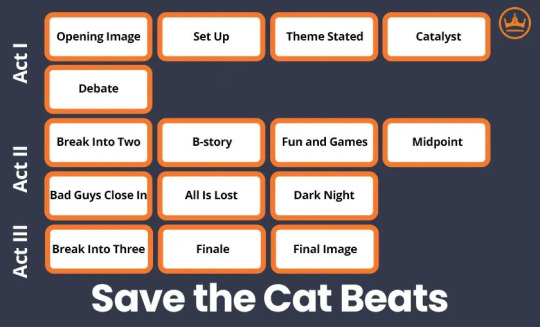
Above are the fifteen beats of Save the Cat and although KB on occasion doesn't hit all fifteen exactly as specified, especially final image as it's continuing, the song and dance is quite similar. Here are examples of The Dark Knight (2008) and Inglourious Basterds (2009), two movies that have inspired Hokazono's work.
Before Chihiro meets Char, we get his opening image of him and his dad forging which is works well as the entire story revolves on the consequences of them creating weapons. We get the set up to his world where he lives with his dad who made famous katanas that wield the power to end a war. The theme is stated, and it's not kept a secret: The katanas they make are weapons made to kill people. Are they willing to carry the burden? In another variation of this question, is Chihiro willing to carry the burdens unintentionally passed down by his father?
The catalyst is his father's murder that catapults him into seeking revenge and recover the katanas.
Now, for the rest of the story, this structure can be applied to the first 18 chapters or even 1-3 chapters at a time which in my opinion, is kind of insane. There's story telling inside the story telling, and these moments are both subtle and grand, signs of a strong and captivating writer. Hollywood would kill for a script like this these days. In order to get you to believe me how prominent these beats are, I'm going to do arc one and Daruma's story. The main story line should be around act one and two right now as of chapter 20, if we want to get down into it, but if anything, this feels like it's moving like a second "movie."
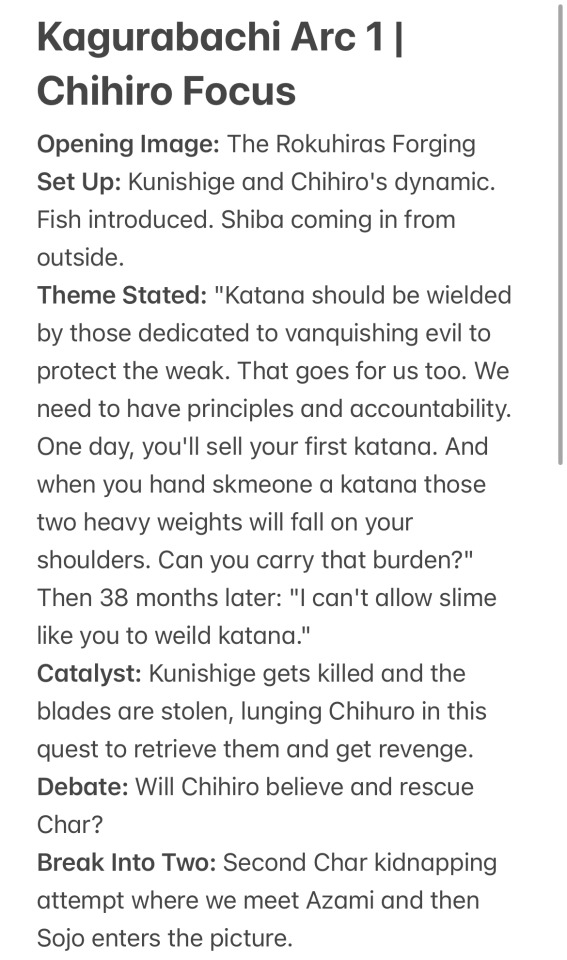
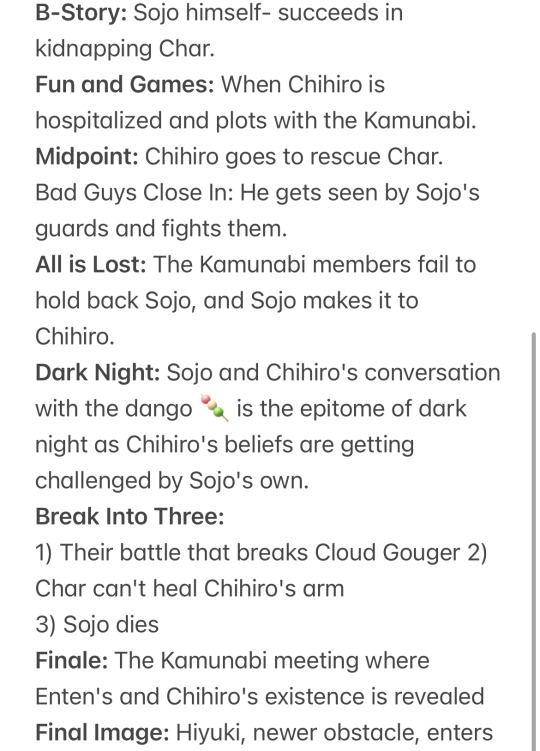
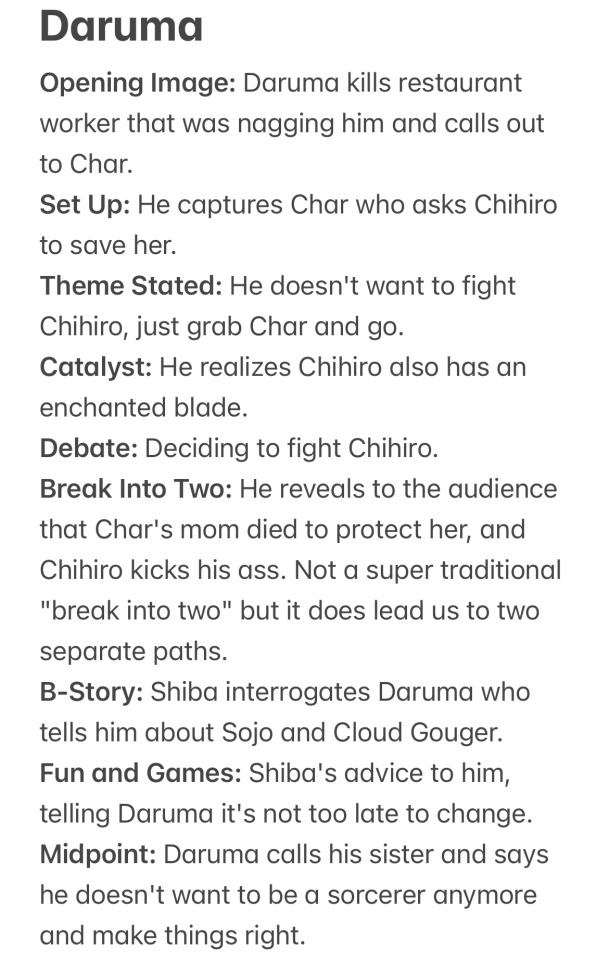

Overall, this structure that comes from Hollywood movies can be identified in multiples parts of Kagurbachi's storytelling. I was going to do beat sheet's for Char and Sojo's stories as well, but I think this is enough of an example of a bigger picture versus smaller. Although other mangas also fall into three act structures, as most story telling does, KB masterfully uses the 15 beats to its advantage. I believe the familiarity of this pace is what hooked oversea audiences, and aside from that, the characters that quickly capture us.
Very quickly, because I don't want to make this about characterization, Chihiro is well written through his past, who he chooses to kill and save, his dialogue that can be surprisingly vulnerable at times, and his cool façade that melts because of how hot he truly runs. He is also straight up a badass. We get handed Char's background in an "all is lost" segment as well as some lore that can present her as a resource for the main cast. We see Azami's phone background photo that's minimum 3+ years old- a government employee with a soft spot for his friends, one who he is still clearly grieving. We get one tiny yet so fucked up bit of Sojo when we see him get a flashback where he's a child and his single dialogue of "I truly love Kunishige Rokuhira," that launched his type of villainy in the maniacal fanboy category. Who does it like that? Nobody but Takeru Hokazono.
Thank you for reading this essay! I do have two other essays drafted, one on Sojo's possible return (I'm a delusional Sojo fan) and just his overall significance and impact as the first villain even if he doesn't return, and on Hiyuki plus servant leadership versus self service.
44 notes
·
View notes
Text
101 Reasons Why Zenyatta is a Legend
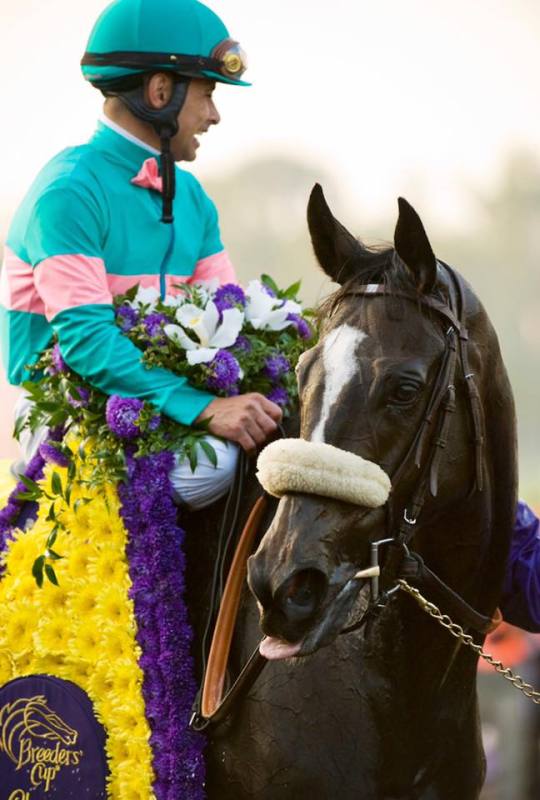
1. She is the first horse to win two different Breeder’s Cup races (The Breeder’s Cup Classic and The Breeder’s Cup Ladies’ Classic).
2. She had one of the most dramatic running styles of all time. She never failed to start slowly and she never failed to finish powerfully.
3. She is the first and only female horse to win the Breeder’s Cup Classic, the most important horse race in the United States.
4. She won a total of $7,304,580, despite not being raced until she was almost 4
5. She won 19 consecutive races in a row.
6. She is the first horse to win the William H. May Award.
7. She broke the all-time North American record for Grade 1 victories by a mare.
8. She tied the all-time North American record for consecutive victories without defeat.
9. Tied the all-time North American record with 16 consecutive victories in unrestricted races (held by Citation and Cigar).
10. She is the top Breeder’s Cup earner ($4,680,000).
11. On August 7, 2010, Zenyatta broke the world record set by Rock of Gibraltar for consecutive Grade/Group I victories
12. Zenyatta surpassed Tiznow, John Henry, and Alysheba in all-time North American earnings (male or female).
13. Hall of Fame trainer Bob Baffert of triple crown winners American Pharoah and Justify said Zenyatta beating his horses in the 2009 Breeder’s Cup Classic “...was the only time in horse racing that I didn’t mind getting beat in a race. If they don’t reward her with horse of the year, it would be a travesty. Zenyatta made the Breeders’ Cup. And the way she won! I’ve never seen a crowd so captivated. It felt like a horse winning the third leg of the Triple Crown.”
14. She was purchased for only $60,000.
15. She won a total of four Eclipse Awards.
16. She was named Horse of the Year in 2010, getting in on the first ballot.
17. Her Breeders' Cup Ladies' Classic was the second-fastest in Breeders Cup history at 1:46.85 for 1⅛ miles.
18. Zenyatta set speed records in the 2008 El Encino Stakes (1:40:61) and the 2008 Lady's Secret Stakes (1:40:30).
19. She is the first mare to win Vanity International Handicap, Clement L. Hirsch Stakes, and the Lady's Secret Stakes for 3 consecutive years.
20. Zenyatta holds both the speed record and record for most wins in the Lady's Secret Stakes. Her connections Ann & Jerry Moss, John Shirreffs, and Mike Smith hold records for most wins (four) by an owner, trainer, and jockey respectively.
21. She was named by Oprah Winfrey to the 2010 “O Power List” in O Magazine.
22. Zenyatta was selected three years in a row (2008–2010) for NTRA's Moment of the Year Award, for her 2008 Ladies' Classic victory, historic 2009 Breeders' Cup Classic victory, and narrow defeat in the 2010 Breeders' Cup Classic.
23. On May 10, 2011, Zenyatta's story kicked off the "Inspire" segment of the 2011 Professional Business Women of California (PBWC) Conference. This organization was founded by California Congresswoman Jackie Speier. Ann Moss, Dr. Dawn Hunkin, and Dottie Ingordo-Shirreffs and several thousand people attended as Zenyatta was presented with a PBWC Honorary Membership.
24. Zenyatta was the first horse to receive an Honorary Membership to the San Pedro Assistance League. Her photo proudly hangs in their official conference room.
25. According to her jockey Mike Smith, she is the greatest horse of the decade.
26. Her career spanned 4 years and she retired sound as ever.
27. She never suffered a major injury.
28. She has a personality like no other. Her funky pre-race dances entertained thousands.
29. She was a hero to people in times of economic hardships.
30. Her trainer John Sheriffs said, “I’ve been around horses for 50 years, and I’ve never seen a Thoroughbred like Zenyatta. She was that special that I wanted everyone who wanted to meet her personally to be able to do it. There was something about Zenyatta that made you feel good.”
31. At 17.2 hh, the starting gate could barely contain her massive frame.
32. She clocked the second-fastest time for 1 1/8 miles in Breeders’ Cup history when she blazed that distance in 1:46.85 in the Ladies’ Classic in 2008.
33. Zenyatta was inducted into the National Museum of Racing's Hall of Fame in 2016.
34. The only race she ever “lost” was her second Breeder’s Cup Classic, where she came in second place, only inches behind Blame, who she had beaten before.
35. She was born on April Fool’s day.
36. She likes beer, preferably stout Guinness.
37. ESPN studied the length of her stride and concluded that it was a whopping 26 feet. For comparison, the average thoroughbred stride is 20 feet and Secretariat’s was 24 feet 11 inches.
38. She was chosen to promote The Dodgers in 2010 and had her very own billboard in Los Angeles.
39. At Del Mar, they use the Trakkus system for clocking how fast a horse is running during a race. When Z won the Clement Hirsch in 2009, they clocked her "closing down the stretch" at 40+ mph.
40. She has beaten every single one of the 135+ horses that have raced against her (yes, this includes Blame).
41. Her heart is the size of a volleyball.
42. While often criticized for primarily running on synthetic surfaces, she started training on dirt and it is what she was most comfortable with.
43. Even though she has broken record after record, people still don’t know how fast she truly is because she always came from the back of the pack and swung all the way to the outside to avoid traffic before winning at the last moment. As her jockey Mike Smith said, she has “another gear.”
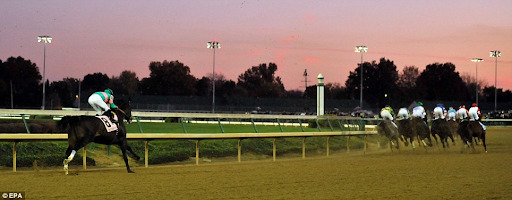
44. She loves foals as much as she loves people. Todd Claunch said, “She loves foals more than just about any mare I've ever been around. When she's outside, all the other foals just come up to her, not just her own.… You can even see her going through the thought process of teaching them things."
45. Zenyatta set speed records in the 2008 El Encino Stakes (1:40:61) and the 2008 Lady's Secret Stakes (1:40:30).
46. She’s photogenic and knows how to pose for photos.
47. Her talent and personality are unmatchable. When asked, “How does Zenyatta compare to the other horses you've been on who won these championship races?," Mike Smith replied “She means more to me than all those.”
48. She lived in Hollywood like the celebrity she is.
49. She can dance. Her moves were taught to her by Mike Smith as a positive way to relieve her endless energy.
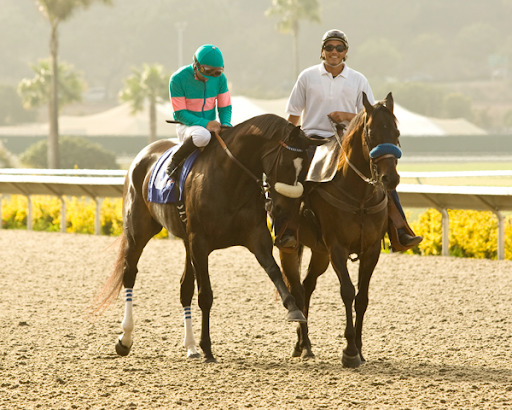
50. She feeds of the crowd’s energy.
51. Mike Smith said, “I think she could arguably go down as one of the greatest, if not the greatest horse of all time." And Mike smith’s ridden a lot of champions.
52. She kicked up so much dirt that Mike Smith once had to change goggles six times during a race.
53. Over a thousand people came to her retirement ceremony, despite below freezing temperatures.
54. She has her own horse race named after her (The Zenyatta Stakes).
55. She was smart enough to control her own energy and exert during the most important part of the race.
56. Her trainer was John Sheriffs, who is known for his kind and patient approach.
57. When she was at Hollywood park she lived on a street named after her.
58. The Dodgers had her on a billboard, with the tagline “This is My Town.”
59. She has her own song written by Liza G. Fly.
60. She blurs the line between a starlet and a horse,
61. She once bowed when the track announcer called her name.
62. Zenyatta’s owners Anne and Jerry Moss love her so much that they almost moved her into their Bel-Air home.
63. A sandwich was named after her at trainer John Sheriff’s favorite coffee shop.
64. She has multiple books written about her.
65. She had her own 60 minutes episode titles “Another Look at Zenyatta.”
66. Her first son, Cozmic One, is the 2018 Retired racehorse Project ambassador.
67. She made “Zenyatta” a word that Urban Dictionary defines as “To meet unrealistic expectations, do things that shouldn't be done, defy all logic, leave observers with a loss for ways to describe awesomeness and be perfect.”
68. She sparked a girl power movement in horse racing.
69. Her fans invented the term “hooves crossed.”
70. She has a trusting soul and a zen-like calm.
71. On June 27, 2009, Zenyatta won the Grade 1 Vanity Handicap at Hollywood Park for the second straight year. She carried 129 lbs, spotting her rivals from 13 to 18 pounds, and became the first horse to win under such a weight assignment since 1977.
72. Her rivalry with Rachel Alexandra was the most intense one of recent horse racing history.
73. The second time she ran in the Breeder’s Cup Classic, its TV ratings were triple what they were in 2009.
74. A single halter of hers once sold for $6,600.
75. Jonathan Bush, nephew of George W. Bush, named his luxury catamaran after her.
76. She is in the Arcadia Historical Society Walk of Champions.
77. Unlike most racehorses, Zenyatta did not jog or gallop to warm up before a race. Instead, regular pilot Mike Smith would let her stand and look over the crowd and her competition. He figured she did enough stretching doing her little dance.
78. Zenyatta retired as the leading money winner among North American-based fillies and mares
79. For three straight years, one of Zenyatta's races was named the National Thoroughbred Racing Association's “Moment of the Year.” The races selected for this honor were her victory in the 2008 Breeders' Cup Ladies' Classic (USA-I), her victory in the 2009 Breeders' Cup Classic (USA-I) and her narrow defeat in the 2010 Breeders' Cup Classic (USA-I).
80. A statue of Zenyatta was unveiled at Santa Anita in 2012, joining the statues of Seabiscuit and John Henry in the Paddock Gardens area near the main grandstand. It took over two years to build.
81. Zenyatta is an honorary member of the San Pedro Assistance League.
82. She stares down anyone who approaches her.
83. The Run the Bluegrass half-marathon in Lexington honors a different Thoroughbred each year, and Zenyatta was the honoree for the 2014 edition.
84. She has her own Breyer model.
85. Her whole pedigree is pretty cool and rare for a top thoroughbred.
86. She is not related to Northern Dancer or Seattle Slew, unlike the majority of thoroughbreds who sometimes feature these horses in their pedigrees multiple times, so she’s not intensely inbred.
87. She outpaces her competitors even in fundraising.
88. Trevor Denman screaming, "If she wins this, she'll be a superhorse" and "This is un-ba-lievable !!" after Zenyatta won the 2009 Breeder’s Cup Classic.
89. She has raised thousands of dollars for various charities, particularly Canter, which helps place ottbs in forever homes. Thanks to her, it has expanded to several locations in the United States.
90. Even though Blame officially won the 2010 BBC, Zenyatta still pulled herself ahead of him after the wire.
91. Thousands bet on her, even when they only got a 10 cent profit off of two dollars.
92. Zenyatta was an inspiration like no other. One school teacher from Santa Barbara who was in a wheelchair when she first met Zenyatta decided to try and walk afterwards, and she did.
93. Kari Bussel from Tennessee once said, “I am terminally ill and my dying wish was to touch her once. I know in my heart she is the reason I am still alive and have thus far defied the odds and what the doctors told me. She inspired me never to give up. I have refused to go anywhere until her story was finished."
94. Although she did not retire undefeated, Zenyatta proved in the end that perfection is not always measured in numbers.
95. She proved that mares can be just or even more profitable as racehorses than as broodmares.
96. She started a new era of filly-dominated horse racing. After her, other great fillies like Rachel Alexandra, Black Caviar, Goldikova, and Havre de Grace started dominating the sport as well.
97. She has over 468,000 followers on Facebook.
98. For two years in a row, she finished second in voting for the Associated Press Female Athlete of the Year, narrowly beaten by Serena Williams and Lindsey Vonn.
99. Sports Illustrated rated Zenyatta as number 1 female horse of all time.
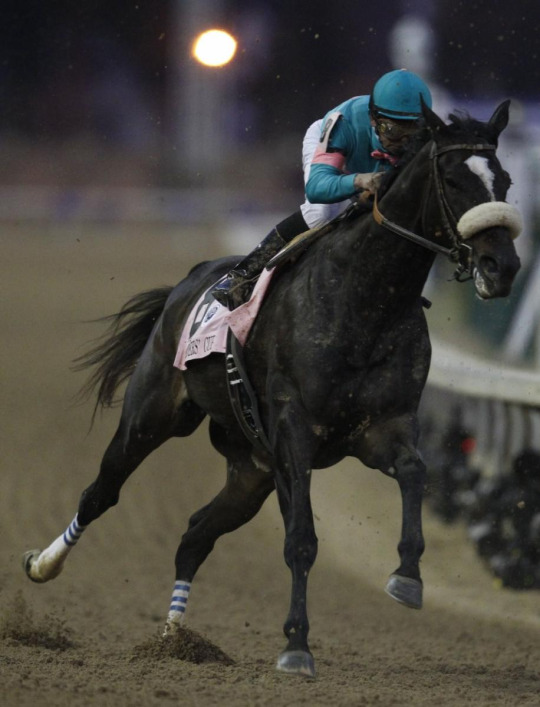
100. She helped revive the struggling racehorse industry on the West coast.
101. She turned the sport of kings into the sport of queens.
275 notes
·
View notes
Text
1. Do you have a nice yard? If so, do you spend a lot of time outside in it? If not, where do you go when you want to relax outdoors on nice days? We have a decent size backyard, but I never go back there. I’m not an outdoorsy person, I much prefer to be indoors. I don’t relax outdoors unless I’m at the beach. 2. Is there a group of friends that you used to hang out with but no longer do? Why don’t you hang out anymore and how do you feel about them now? I don’t have any friends anymore and that’s completely my fault. I became very distant and withdrawn and just disappeared essentially from everyone. It wasn’t anything they did, I just fell into a bad place and I haven’t been able to get out. I’m such a shitty person for completely abandoning them the way I did. 3. Do your parents enjoy any of the things that you enjoy? Do you bond over these things? My mom and I have a lot of shows we like to watch together, we like a lot of the same music and movies, we both love to read, and we both follow entertainment/celebrity gossip. 4. Did you ever say or ask something that you assumed was a neutral subject, but the person you were talking to became offended and you had no idea why? Not that I can recall. 5. What is the movie that you have waited the longest for/which film do you remember anticipating the most/are still anticipating? There’s been several movies like that. Like for example, I always look forward to new Marvel, DC, and Star Wars movies.
6. Do you have any ideas for a story or movie you’re planning to write or you’d write if you got the time/had the talent? Please share a synopsis! Nope. 7. Do you ever feel like anyone is “out of your league” or does that concept not make any sense to you? What do you do when you’re attracted to someone but find them out of your league? I always get it mixed when it comes to that saying. Like, to me it means that I’m ugly and have no chance with anyone I’m interested in. Does that mean I’m out of their league or they’re out of mine? 8. What is something that an interested guy/girl could comment about you, that would make you instantly open to them (e.g., “That book you’re reading is from my favorite author”)? Hmm. I don’t know. 9. Do you refer to yourself by any sort of fan nickname (Belieber, Little Monster, etc.)? Lol no. I’m old. 10. Do you ever just get lazy and give up on your friendships? I didn’t do it out of laziness. It happened because I’m a mess of a person and I just couldn’t handle or put in the energy into any friendships. I couldn’t even take care of myself. I didn’t give up on them, I gave up on myself. 11. Is there a person in your life (maybe barely) that you feel in constant competition with (even just in your imagination)? Maybe you feel they are consistently outshining you. I had a friend who I felt made things into a competition and tried to one up me in the sense of who had it worse. Like, if I actually opened up about something and expressed how I was feeling, she’d spin it back on her somehow and her problems were always worse of course. One time she even said to me, “what do you even have to be depressed about?” and proceeded to go on about all the problems she has. 12. If you are single, even if you are normally happily single, are there certain specific things you witness that make you wish you were in a relationship (e.g., people getting engaged)? I mean, I’d like to experience love and romance and have someone to experience life with. I want that special someone. I want to do couple-y things. I want someone to get takeout and binge watch TV shows with, someone to drink my morning coffee with, someone to grow with, someone to travel with. I want all that someday. It’s hard for me to even imagine it ever happening, though. I’m almost 30 years old and haven’t found it, yet. I don’t see anything changing anytime soon, either. 13. What sort of situations make you feel most self-conscious or inadequate? Are there any people or places that just make you want to crawl into a hole? If you can’t think of anything specific, can you remember the last time (or any time) you felt this way? I feel extremely self-conscious and inadequate all the time. 14. Out of all your usernames for websites, which one is your favorite? Do you use it for more than one site? I’d rather not say what it is. 15. Are there any cities near you that you’re afraid to go to because of the crime rate or its other bad reputations? I city I live in has a high crime rate and bad reputation. :/ We’ve wanted to move for a long time, but we haven’t financially been able to do so. We really want to try and do so soon, though. 16. If you went to camp as a kid, was it a pleasant experience? Do you think that all kids should be able to go to camp? If you didn’t go to camp, do you feel like you kind of missed out on something? My 6th grade class went to science camp, which was a thing a lot of 6th grade classes did at various schools in my state at least. I don’t know if that’s a thing anywhere else. Anyway, it was actually pretty fun. We we were there for a week and were out in the woods doing nature-y things and learning about that kind of stuff, but they made it interesting and fun. We went to the beach one day, too, which was really fun. We had bonfires at night and sang songs. We did fun things with our cabin mates and cabin leaders. It was cool. I also went to a Girl Scout camp for a week, which was really fun. We put on skits with our groups and did a lot of other fun activities. 17. Do you grandparents ever judge you or stick their heads in your business? If not, is there someone else in your life you dread seeing because of their unwanted input? I love my grandparents, and I know my Nana just loves and cares about me and is concerned for my wellbeing, but yes I do feel judged sometimes. There’s things she doesn’t understand. 18. Have you ever spent the whole day (or multiple days) just looking up one thing on the internet (e.g., videos of your favorite band, how-to videos, quizzes, etc.)? Probably when I was younger. 19. Would you ever go on a media fast (i.e., avoiding tv, movies, the internet, and magazines for a certain amount of time, in an attempt to become aware of how media makes you feel)? Do you think that sort of thing would benefit you? Nah. That would be incredibly boring, ha. 20. Are you happy with where you currently live? If not, what don’t you like about the area and do you plan on leaving? No. I already explained why. 21. If someone told you that we live in a society that hates women, how would you respond? Okay. We live in a society that hates everything. <–TRUTH. <<< Honestly, though. 22. When was the last time you were on a boat? Whose boat was it, and what were you doing? Like 2008/2009. It was a boat that took us across to an island where we were toured Alcatraz in San Francisco. 23. Have you ever been completely blindsided by a break-up or have you sort of felt all of your relationships deteriorating before they ended? If you would prefer not to answer, what is the last instance you can remember being totally blindsided by news you heard? I mean, it shouldn’t have come as a big surprise. He didn’t want to commit and it he didn’t feel the same way I did about him. He completely played and used me, and the worst part is I let him. Then one day he decided he was done with me and it all stopped. There were times things were good and times things were bad and we were on and off, but when it finally ended for good I didn’t know it would really be over. Even though it should have been blatantly clear it was coming. What I was completely blindsided by; though, was when Ty just deleted Facebook and Instagram and fell off the grid. I haven’t heard from him in 3 years. I have no idea what happened to him or what he’s doing and I have no way of finding out. 24. Can you remember the last thing you thought and subsequently thought, “wow, I really shouldn’t be thinking that”? Hmm. Not at the moment. 25. If you ever think about getting married, what are some aspects of the wedding that you would like to see in a non-traditional manner (e.g., a different color dress or “partners” over “husband” and “wife”)? I don’t think about getting married. I don’t plan on ever getting married.
3 notes
·
View notes
Text
How Pandora Won Its Royalty Battle But Lost the War to Spotify
For a few years in the late 2000s, Pandora was the on-demand DJ for tens of millions of people, creating the soundtrack to college dorm room parties, quiet coffee shops, busy kitchens, and family get-togethers. The days of building massive MP3 music collections through file-sharing was receding quickly into the past, and instead the shared experience of radio was making a comeback via the clever algorithmic matchmaking of Pandora's endlessly customizable stations based on individual taste. Today it's a feature we take for granted across every music service, even if Pandora's implementation still seems like it was the best. Pandora itself, however, can feel like an afterthought. Betamax to Spotify's VHS, or maybe more accurately, MySpace to on-demand streaming's Facebook.
It's not that Pandora was oblivious to its competition, or complacent about its place in the industry. It was, however, an innovator in digital music at a time when the major labels were hostile to the entire concept and would fight on every front to preserve the lucrative of the compact disc era. To take on this legal and lobbying juggernaut, Pandora needed a clever strategy to avoid the kind of head-on fights that had sunk Napster. The solution was the radio model of music licensing, a brilliant strategy at the time, but one which would be the subject of a long fight between Pandora and the recording industry. Pandora would win that battle, but in doing so, it also found itself stuck with a business model that could not evolve alongside the streaming space.
Pandora’s personalized radio service took the FM listening experience, put it online, and exploded the typically narrow path to music discovery for millions of people. It was the first real introduction to digital streaming music for a lot of America’s population in the mid-2000s. People could type in a song or artist they liked and get a never-ending stream of related music.
On the surface, at the listener level, the magic was in how all the songs were linked and connected. Behind the scenes, the magic was in how Pandora was able to provide access to all these songs, without asking the major labels for permission.
Radio broadcasters don’t have to spend exorbitant amounts of time and money trying to license every song from major record labels: they only need to pay a small fee each time songs are played. So after developing its music discovery technology, the Music Genome Project, Pandora went into radio to take advantage of the same licensing agreements already in place.

The Tower Records "music discovery center" powered by SavageBeast / mockup courtesy of Dan Lythcott-Haines
For Joe Kennedy, Tim Westergren, Jessica Steel, and Tom Conrad, the four Pandora executives leading the company's rebirth as a digital broadcaster in 2004, this was the only path forward. Radio was the path to profitability in the music industry.
“It was already clear to us that most of digital music was a disaster from a business standpoint,” said Former Pandora CEO Joe Kennedy. “At that time the four labels didn't want digital music to really exist, but we found this one piece in internet radio where there was the statutory license that, I felt, gave the potential to create a business of value and avoid this phenomenon one board member referred to as an organ donor business — where you just exist to funnel money to the major record labels.”
As a quick background, Savage Beast Technologies was founded in 1999 by Tim Westergren and would later become Pandora. The company spent years developing its Music Genome Project music recommendation engine to help people find new songs and artists similar to their existing tastes in music. It powered a few in-store kiosks at Best Buy and Tower Records, but the Music Genome Project itself never found a viable market fit. In 2004 Larry Marcus and Walden Venture Capital’s lead investment saved the company, starting a new chapter. Jessica Steel joined as VP of Business and Corporate Development. Tom Conrad came into engineering, but quickly rose to Chief Technology Officer. Founder Tim Westergren moved from CEO to Chief Strategy Officer and Joe Kennedy was hired to be the company’s new CEO.

UI mockup courtesy of Dan Lythcott-Haines
Kennedy got to work on a new business plan and put the pieces together to pursue radio. Looking at LaunchCast’s success (a similar service to Pandora, which would later be acquired by Yahoo), along with potential market size and fixed costs through the statutory license it was their path towards profitability for the startup.
Pandora launched its personalized radio service in the second half of 2005 paying a per performance rate of $0.000762 each time a song was played.
The Battle Over Rates
Pandora and other webcasters were paying song rates from the 1998-2005 timeframe. By the fall of 2005, Pandora was already too late to officially participate in the hearings happening to assess rate adjustments for the next period of time. Kennedy did, however, stay connected to how testimonies to the Copyright Royalty Board were progressing. The CRB was created under the Copyright Royalty and Distribution Reform Act of 2004 with three permanent copyright royalty judges.
There were several different groups and sides presenting their case for what they wanted, one of which was the Digital Media Association (DiMA) representing 42 companies including AOL, Live 365, Microsoft, Yahoo!, and AccuRadio LLC. Another, representing the entrenched music industry, was SoundExchange and executives from Atlantic Records, Sony BMG, Universal Music Group, and other labels. Mixed in were groups identifying as terrestrial radio, small webcasters, large webcasters, commercial, non-commercial, and so forth. There was plenty of nuance to the companies and groups wanting special considerations to the rates they would pay.
SoundExchange and its side argued for 30 percent of gross revenues from webcasters or a performance rate beginning at $.0008 per performance in 2006 and increasing annually to $.0019 by 2010, whichever was greater. It wanted the rates to be as high as possible.
The DiMA group wanted a fee structure of either $.00025 per performance or 5.5% of revenue directly associated with the streaming service. For a lot of these internet companies, music was not their main business, but an ancillary one.

Tim Westergren, co-founder and chief strategy officer of Pandora Media Inc., center, Steven Newberry, president and chief executive officer of the Commonwealth Broadcasting Corp., left, and Christopher Guttman-McCabe, vice president of regulatory affairs with CTIA Wireless Association. House Energy and Commerce Subcommittee hearing in Washington, D.C., U.S., on Wednesday, June 6, 2012. Credit: Andrew Harrer / Bloomberg via Getty Images
Pandora may have entered the music industry a little naively, planning for a world where the statutory rates remained low and they had time to bloom. Even before its plans for radio, it had run out of cash multiple times. In 2000, venture capital dried up fast from the first dot com bubble bust and left the company scrambling for new funds early in its life. Tim Westergren, always the easygoing and formidable guy, never laid anyone off, he simply asked those who could continue working without pay to stay with the eventual promise of reimbursement once new funding came in.
Even after receiving around $7 million in funding in 2004, Pandora didn’t have the capital to either negotiate direct licensing with record labels or the runway to offer free, ad-supported radio. It had to launch as a subscription service to cover some of the costs. But, shortly after launch it secured a large investment by James Feuille and CrossLink to make the transition to free ad-supported radio.
“Fundamentally, I did not believe people would pay for radio,” said James Feuille. “The idea was $3 a month, $36 a year, with no advertising and I just didn't believe you could build a big business like that.”
The numbers from the 2005 launch reflected most people’s reluctance to pay. Pandora radio launched with 10 free listening hours before it presented a paywall and cut off listening to non-subscribers.
“They generated 500,000 users, zero to 500,000 users in six weeks,” said Feuille. “At the end of six weeks, 40,000 people had subscribed, it was .08, not even 1 percent.”
Despite its growth and the excitement it was generating, Pandora spent its first several years struggling to keep the lights on. It had publicly warned of pulling the plug. It was paying artists according to the law — which wasn’t a given in the early days of digital music — but it didn’t think it could afford to have the rates double or triple.
The Night The Lights (Almost) Went Out in Oakland
The Copyright Royalty Board presented its decision in March 2007. Included was a summary each side had been making against the other: “SoundExchange accuses the Services of seeking a marketplace characterized by perfect competition. DiMA and the Radio Broadcasters claim that SoundExchange is championing a marketplace characterized by monopoly power on the seller’s side.”
The three-judge CRB sided with the proposed rates from SoundExchange and the major labels. The new per play rates would be $.0008 for 2006, $.0011 for 2007, $.0014 for 2008, $.0018 for 2009, and a per play rate of $.0019 for 2010.
“It was March 2007, I'll literally never forget the moment,” said Joe Kennedy, Pandora CEO at the time. “I had just come through the tunnels on my way to work in Oakland and Tim [Westergren] gives me a call and says there's a decision out of Washington. He read me the rates and it was like, oh my god, the rates are almost triple. I immediately knew that’s game over, there's no path forward.”
Westergren knew Pandora was in trouble so he immediately spearheaded a grassroots campaign to persuade its listeners to contact their congressional representatives. This effort resulted in the Webcaster Settlement Act of 2008 that was able to bring those involved parties back to the table and try to negotiate a different rate settlement. It allowed for a simplified process to amend any deal that could be renegotiated between the parties. Webcasters, including executives at Pandora, were anxious to find a number they didn’t think would put them out of business.
Although the bargaining table had been set again, this time joined by Pandora, there was a significant amount of division among the companies and groups. RealNetworks with its Rhapsody streaming service saw Pandora as a competitor and potential threat. The National Association of Broadcasters saw internet radio as less desirable and profitable and was happy to see it go away or remain small. They were primarily interested in addressing their problem of simulcasting over the internet. Yahoo was an advertising company and so it didn’t want revenue sharing from non-core products to eat at its bottom line.
The labels had the upper hand with the increased rates they had asked for already in their pockets. Plus, negotiators for SoundExchange and the Recording Industry Association of America understood these divides and played them against each other.
As CEO of Pandora, Joe Kennedy was representing it in these negotiations, trying to keep the company on a path to profitability. Pulling out all the stops, Pandora even went as far as to offer private stock in exchange for a compromise agreement. The labels weren’t interested.
“The major labels came back and said, Well, you know, we shared this with our business people, and they took a look at it, and their analysis says, even at the lower rates, there's no chance you guys are going to make it,” said Kennedy.
In its first years as a digital radio service, Pandora and its millions of listeners had become an annoyance to the major labels. Historically, major record labels exhibited all the power in the relationship with terrestrial radio. FM radio was a promotional vehicle for labels to sell their artists. Digital services like Pandora were shifting that promotional power away from the labels with algorithms and user input.
If Pandora continued growing it would become a threat to power and control within the music industry. Circumventing directly licensing music through its use of the DMCA was seen as combative since digital music was already marked as undermining established business. Pandora was scrappy, having already moved Congress into action once, and that was worrisome.
The 2008 Settlement Act didn’t do much when it was signed by Congress. What it did do though was allow for a simplified process for new settlement approvals. The stage was set, if Pandora and its other webcasters could reach a deal with SoundExchange and the labels by the stipulated date of February 15, 2009 then it would go into effect simply by submitting it to the Copyright Royalty Board. There wouldn’t have to be any pre-hearings, public comments, or any of the previously required steps in the tedious process.
Despite Joe Kennedy’s best efforts, the deadline passed and Pandora was momentarily left with a decision. Would it accept a mountain of debt that rose higher as it gained popularity and more songs were played or would it pack it all in and call it quits?
“I wrote an email for the board that night and more or less said, I tried, failed, it's over,” said Kennedy.
Kennedy called Tim Westergren in the middle of the night to let him know. Westergren answered from a bus in Jordan. He was in the Middle East on a congressional delegation with his wife. Kennedy explained that the deadline had passed and negotiations had failed. The previously tripled rates set by the Copyright Royalty Board in 2007 would take effect.
Westergren replied that Congressman Howard Berman was currently on his bus. He would talk to him about the situation and see if there was anything he could do.
Congressman Berman was representing Los Angeles’ 26th district in 2008 and was on the Intellectual Property subcommittee, part of the Judiciary Committee. Congressman Berman had the right connections with people from most parties involved in the entertainment industry.
“I fully believe we had Right on our side back then,” said Westergren. “And I had the perfect timing to just explain the whole story, not the caricature that had been told to him. I think he heard it and said, what you're asking for is fair. Ultimately that’s why I think he intervened.”
“[Berman] called from Amman back to Washington and got some kind of procedure where a page on the floor can open the chamber and make some change,” recalled Westergren. “And because he was Chairman of the Judiciary he had some abilities or power to extend the deadline.”
Westergren called Kennedy back and told him that Congressman Berman said to keep going. This was happening in the middle of the night back in the U.S., a few hours after the deadline had passed. Because of the speed, negotiations didn’t have a chance to unwind from where they were left the day before.
“I immediately got on the phone with two more people,” said Kennedy. “First the point person in the negotiations and then our biggest ally who was with the Independent Music Association. I said, I just talked to Tim, Tim just talked to Berman, and Berman said we should keep going.”
In light of the immediate progress, Kennedy quickly amended his initial email to Pandora’s board admitting defeat, saying everything was over — it wasn’t yet.
“I think by the time the board got the first memo, I'd already sent a second memo that told the whole story of Tim talking to Berman and to hold on because maybe there's still some hope,” recalled Kennedy chuckling.
On July 7, 2009, more than two years after the rates had been set to increase, a settlement deal was formally announced. In the press release, John Simson, Executive Director of SoundExchange, said, “It’s a creative, groundbreaking approach that we wanted to try, and we hope it will work well for everyone involved—the artists, labels and eligible webcasters.”
The new agreement allowed for webcasters to pay per performance rates ($0.0008 retroactive to 2006 and increasing to $0.0014 by 2015) or 25% of revenue — whichever was greater. The per performance rate was a little bit lower, but the introduction of the revenue sharing would help webcasters keep costs in check and plan for the future.
The Power of Tens of Millions of Listeners
Pandora might have been on the ropes when it came to money, but it was a growing powerhouse of influence. In 2009 Pandora had seven million monthly listeners. Five years later in 2014, it had over 81 million monthly listeners. Westergren even attributed its active listeners calling members of Congress in the early days to its new settlement and Pandora’s ultimate survival.
Pandora’s radio service might have just hit at the right time to fulfill consumer demand and grow in popularity. It could have also had the right timing to land in the middle of Apple’s mobile revolution fueling its growth, but the truth is that it spent years working on its streaming backend and engineering so that it could hit it big overnight with the iPhone’s App Store.
Through Jessica Steel’s leadership, the team identified mobile early on and started by putting Pandora on flip phones with network carriers like Sprint and AT&T. At the time, this only resulted in a few hundred listeners, despite the major engineering effort involved. After Steve Jobs announced the iPhone in 2007 it became apparent that this new internet connected, “music player,” device in people’s pockets needed to be the future of its mobile efforts.
After pushback on only allowing web apps for the iPhone, Steve Jobs announced that native apps would be coming to the iPhone. In the interim, Apple Senior Vice President Scott Forstall invited Tim Westergren and his CTO, Tom Conrad, over to a local Cupertino lunch spot. The trio talked for hours about what Pandora had learned about streaming audio from putting apps on flip phones, like Motorola’s RAZR, for wireless carriers. The meeting ended with a question for Forstall.

Credit: Andrew Harrer / Bloomberg via Getty Images
“What, if anything, can we do at Pandora to get ready for the next generation of iPhone that includes an app store and native APIs?” asked Conrad. “Forstall said, it wouldn't be a waste of your time to jailbreak some iPhones and use the kind of back door toolkits that were being distributed by other people to build a native Pandora app while we get our act together at Apple on something more formal.”
So, Conrad, designer Dan Lythcott-Haines, and many others on the team got to work jailbreaking iPhones and working on a Pandora iPhone app ahead of the official APK release. Then, on day one of the App Store launch, Pandora was the first internet radio app available. Nine months later the Pandora app was installed on 21 percent of iPhones.
Five years after that first iPhone app, nearly 80 percent of Pandora’s radio listening was on a mobile device. But even with a great mobile experience and ubiquitous access across all kinds of devices into the future, its linear, radio style appeal was encountering pushback from listeners.
“We always knew there was a portion of how people listened to music that we were not addressing,” said Joe Kennedy. “I think what changed over time was obviously the emergence of Spotify, but I think alongside that is not just in music but across the board, people's willingness to subscribe to things on the internet grew quite a bit over time.”
The Spotify Effect
By 2010, after it went through these settlement negotiations, Pandora was fully entrenched in radio. It had gone to court for it. It had become the face of internet radio and was becoming the torch bearer for the idea of radio in a lot of people’s minds. There was a consumer demand for this style of music service but Pandora and its executives were getting locked into the protection and cover they thought the statutory license afforded it.
Pandora was feeling heat from listeners who wanted to be able to listen to any song they wanted to at any time. They wanted more skips and other features that were outside of the statutory license’s scope. This pressure was one piece, of many, that led to Joe Kennedy announcing he would be departing as CEO in 2013.
“There’s many pieces to this puzzle of why I decided to leave,” said Kennedy. “Among them was the natural strain of having worked with the board for a long time, the strain of being a public company, and this very significant pebble in our shoe of what to do about Spotify and the on-demand business.”
Pandora finally launched an on-demand offering in 2017. It took years to repair relationships and get to a place it could work with the major labels. The work started secretly in 2014 which eventually led to Pandora acquiring Rdio’s on-demand licensing deals and other assets in 2015. In exchange for these on-demand licensing deals, Pandora agreed to renegotiating new, direct, radio licenses outside of the DMCA shelter.
Pandora spent the first half of its life chained to and defined by the DMCA’s statutory royalty rates. It then spent the next years not quite sure how to move forward. It saw the terrible financial deals that Spotify was making in order to gain on-demand streaming access to the major label’s music catalogs and didn’t want to be in that same boat. It tried getting into ticketing and events in order to control its own financial destiny, but it didn’t pay off.
“The reason we really did jump into on-demand was more about the porousness of publishing rights than anything else,” said Tim Westergren. “The industry had us in their crosshairs and after a while it's hard to be at war with your suppliers. There was too much potential for publishers to do monkey business and we had less and less confidence in the security of some of these statutory structures. We were vulnerable.”
“I think that we still squandered an enormous opportunity having survived all [those settlement negotiations] by not pivoting to on-demand fast enough,” said Westergren. “I feel incredibly proud and sort of marvel at what we got through, but I also have a lot of frustration about how we let it slip away after we established such a lead.”
The way Westergren describes it, Pandora should have become Spotify, before Spotify had the chance to.
“We should have done what Spotify did and ate a pound of flesh to get the industry on our side, then expanded the scope of the product and then really gone global and become an all-you-can-eat service,” said Westergren.
Today, in 2021, it’s nearly impossible to determine what Spotify pays in royalties per play. How much a song is worth varies among labels, artists, and other complex contractual details — including whether plays come from Premium subscribers or free listeners. The deals remain secret until frustrated artists eventually spill the beans on their own terms and provide a peek behind the curtain. In the end, musical artists continue to be the ones dealt the bad hand. Spotify pays major labels huge financial sums and upfront guarantees while it’s estimated that most artists will see payments of between $0.003 and $0.006 per song play.
Pandora still remains an active player in the music streaming space and counted 58.5 million monthly active listeners at the end of 2020. Depending on which music listener you ask, Pandora is a fond memory of digital music coming into its own, or its radio service may still be a vital part of their passive listening experience. Attention wise, however, Pandora is being left behind as Spotify and Apple Music push faster and further into on-demand streaming, sucking all the oxygen out of the room.
How Pandora Won Its Royalty Battle But Lost the War to Spotify syndicated from https://triviaqaweb.wordpress.com/feed/
0 notes
Photo
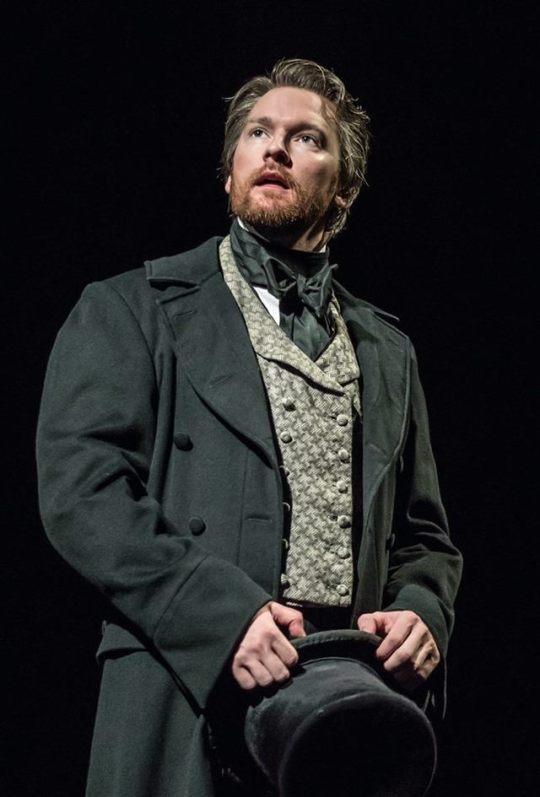
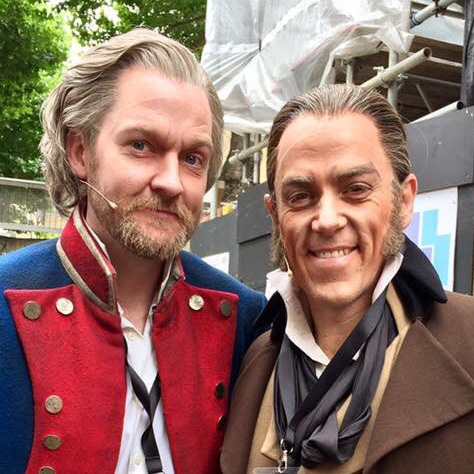
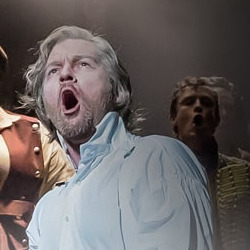
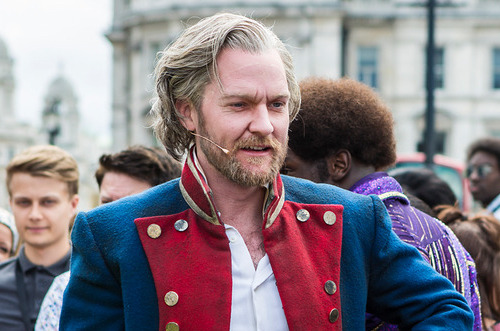
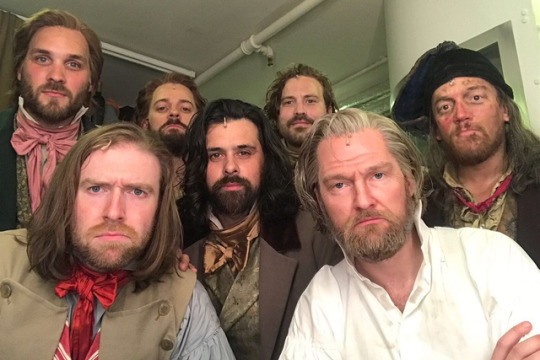

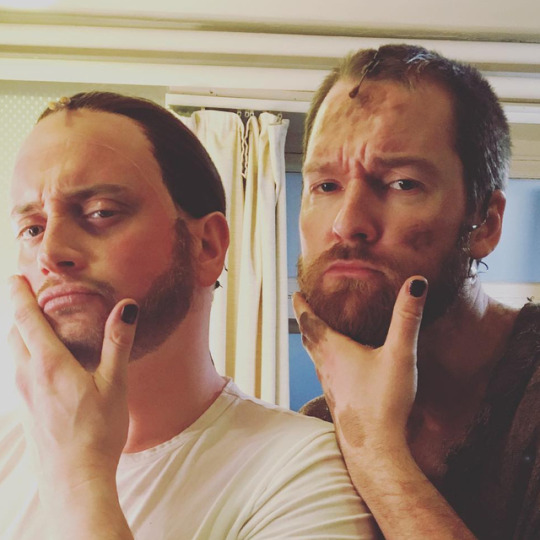

Best of 2017 Countdown #1 :: Him, brought home. [ 2 | 3 | 4 | 5 | 6 | 7 | 8 | 9 | 10 | 11 | 12 | 13 | 14 | 15 ]
What could I possibly say that I haven’t said already, and multiple times? Maybe this: that Killian Donnelly’s return to Les Miserables to play Jean Valjean six years and a day after he took his last bows as Enjolras seemed like an only half-possible dream, one I imagined might come true in another five years if we were lucky, but then just—did, here and now.
Investment can be defined as an act of devoting time, effort, talent, or emotional energy to a particular undertaking with the expectation of a worthwhile result. To say that Killian is invested in Les Mis, and vice versa, would be a colossal understatement, but let’s go with it anyway. In an ideal world, an actor retains more than just respectful memory of a good first professional job, especially if said actor has walked into that job through the side door, utterly without training beyond amateur dramatics, but with one hell of a rich voice, a rough presence, and enough self-deprecatory cheer to knock over jaded producers. That Killian takes every chance possible to credit Les Mis for everything it’s given him since all the way back in 2008—for the education and experience and friendships and the rounding off of his many physical and vocal edges as he progressed from Swing to Enjolras in 2010/2011—is a testament to his love for the show, and good god, does it ever love him back. If I remember correctly, the only male roles he’s not played in the show are Marius and Thenardier, and he’s found something to bring to every other.
Still, Valjean is no bone-throw of a gift to an actor, even one so deeply part of the Les Mis family. It is an investment in an actor and his gifts both as actor and as man, a mutual commitment between show and actor to carry this monster on that actor’s shoulders and back, sometimes somewhat literally. He may have been surprised by the call to audition for Valjean—I say may because I don’t entirely believe that, whatever enthusiastic bright-eyed and bubbling noises he’s made to that effect in interviews—but he should not have been. No one in a position to influence or be influenced could have missed the trajectory Killian had taken over the last few years, and the timing was good for both the show and Killian himself. The trust implied in allowing Killian to step in with what was essentially fewer than ten good days of rehearsal after he’d left New York speaks volumes; it means a great deal more than just thinking he’d remember how to deal with the revolve.
So, the casting. After an early spring of going over and over it again in my head and weighing several things that had happened around and with Killian in NYC over the weeks before and one offhand conversation, I woke up on Thursday 27 April thinking this is it, this has to be it; if it’s going to happen, make it today. Baz Bamigboye of the Daily Mail typically releases casting news and/or gossip on Twitter late on Thursday nights in the UK/early Thursday evenings in the US, so I had one screen open with that while another showed something that … might have been work, if I hadn’t been so distracted. Then the news came, and it’s rather pointless for me to even pretend I didn’t tear up and feel that old fanfic trope, that release of breath you didn’t know you’d been holding. (There was also some light screaming.) The rehearsal period was going to be so short and brutal, and Killian would be coming straight off an (albeit joyously, finally) emotional run in Kinky Boots on Broadway, but it would be so worth it.
The West End Live performance was a ride. Killian’s Bring Him Home had me rather nervous, and I didn’t love every choice he made, but One Day More was perfection—it was so wonderful to hear Valjean carry the song, and to hear that glorious voice ring out every single One day more! through the crashing wildness at the end of it. I knew at that point that all would be well, that even so soon into the run he’d found something to act as foundation and that he’d continue to grow in the role—and he has. The photo above of him onstage in Trafalgar Square, alone, looking out into the crowd that day made my cold, blackened heart fill with warmth and an absolutely ridiculous, unearned pride that hasn’t abated yet.
Is Killian’s Valjean perfect? No; this year’s resident direction has rushed the production to a point where emotional impact suffers, costing Killian in terms of getting some of Valjean’s truly strong moments across; and he’s occasionally still just as baffled by the end of Who Am I? as he was when he was covering the role. Is his Valjean truly his own? For the most part; there is little to point to in his take that one can say ‘belongs’ to other Valjeans, certainly not to the ones with whom he worked from 08–11. Is it worth the time and effort and the emotional energy—the investment of the show and of Killian himself? Indisputably.
No matter how many words I throw at this screen, I can’t put across how much it is. That beautiful clear bell of a voice that both carried the most gorgeous version of Bring Him Home I’ve ever heard is not what you hear now; it has matured, obviously, as has Killian. But the years between then and now have not harmed much, and in terms of acting, he can go to the most haunted (and hunted) places now, in ways that never rang completely true before, and as I suspected would happen, in the one-on-one scenes, everything he’s learned over the past few years—most especially in Memphis—has made him an incredibly generous actor, tender and careful in one moment, and challenging and thrillingly baton-passing in the next.
(And given that it is me writing this, a moment in the shallow end of the pool: he looks fucking incredible from Monsieur Madeleine until the finale; it’s as if costumes and makeup and wigs have been waiting for this Valjean their whole lives. I confess to making terribly obscene noises at the first appearance of M. Madeleine in Jeremy Secomb’s scarecam video, and the production photography had me half off my chair. No one is surprised, either by that admission or that I gave that photo precedence above.)
Killian has said that when covering Valjean, the show seemed to fly by in an emotional and physical rush; I imagine both that he’s learned the pacing now but still gets caught up in it, and that while he’s not entirely comfortable in the role of Show Dad the way some Valjeans have been, his leadership is in place and his love and respect for his castmates is genuine. He offers advice when asked (and is down for the Yoda comparison) and strongly encourages the work of the Swings and ensemble. For the beginning of the run, Killian was able to share the stage with his very good mate Jeremy Secomb—a nice way to get his feet back under him again, especially with such a compacted rehearsal time, and a few months they both deeply appreciated. His relationship with Hayden Tee is obviously different, but still massively good fun. Both Javerts have challenged and welcomed and worked with him so well.
And come 22 January, everything levels up another notch and possibly to infinity with the return of David Thaxton as Javert. This was my greatest wish for Killian-as-Valjean: to have this remarkable foil in Thaxton, to allow their intense rapport to translate to these two roles. (For the sake of everyone’s sanity, I’ve redacted a short essay on the loss of their potential Enjolras & Grantaire double-act, which never properly materialized after Killian chose not to accept the role of Grantaire in 2009.) I’d hoped for it for a very long time, knowing that that the possibility required Killian to mature on several levels and Thaxton to not grow bored or bitter. Having talked about the possibilities involved there quite a lot before, I won’t go further into them now (though I certainly could, given Killian’s take on Valjean as it stands at the moment), but I will say that I cannot wait to see what they bring to and out of each other again. (And to catch Killian watching Stars from the wings again, losing it on a whole new level.) As a fan of the show itself, of each actor, and of the combination of all three, I will put on the table right now that the next six months of Les Miserables in the West End are going to be for the books. As the song says, and all our debts are paid.
If you’ve made it this far, I hope you understand a bit why I can’t—and have no intention to—shake that ridiculous, unearned pride in Killian, for returning to the Queens, for bringing with him glorious perspective and maturity and joy and responsibility, for coming back—home.
#best of 2017 countdown funtimes#killian donnelly#oh killian#barefoot on the lawn with shooting stars#long post
33 notes
·
View notes
Text
MY FAVORITE MUSICAL DISCOVERIES OF 2017
Only reviewing the contemporary stuff can be boring - besides, there’s a virtually infinite amount of music just waiting to be discovered of every shape or size you could imagine out there going back decades and decades. So, here are some albums I’ve had the pleasure of discovering and falling in love with in this past year or so. No particular order.
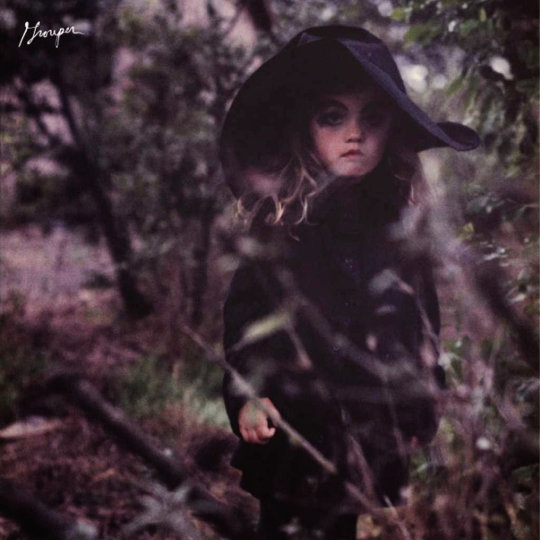
GROUPER//DRAGGING A DEAD DEER UP A HILL (2008)
Up until the point where I started listening to Grouper, I had a bit of a hard time taking the idea of guitar-based ambient music seriously. Guitars are anything but ambient; they’re naturally percussive, their notes don’t ring out much longer than a second or two at the most, and unlike synths, which can fade in and trail off infinitely, guitars produce sound within a far narrower spectrum of both length and frequency. Needless to say, I was pleasantly surprised by how wrong Dragging a Dead Deer proved that idea to be. Grouper mastermind Liz Harris takes a completely different approach to recording guitar, shrouding the instrument (and her voice) in countless, sometimes impenetrable sounding layers of field recording and noise. What makes the album work, for me, is how magical it feels to cut through all of that and find songs as beautiful as Invisible or my favorite, closer We’ve All Time To Sleep. Furthermore, Harris really gets the best of both worlds on Dragging a Dead Deer, building all of the seductiveness and intimacy of a folksy guitar record as well as the total mental windex effect the best ambient music can have.
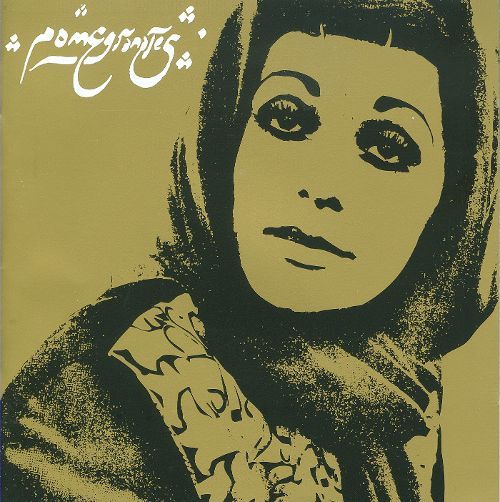
VARIOUS ARTISTS//POMEGRANATES: PERSIAN POP, FUNK, FOLK AND PSYCH OF THE 60S AND 70S (2009) If even one person decides to listen to Pomegranates because of this here piece, writing it will have been worth it. Cataloguing the surprisingly vibrant music scene of the former nation of Persia (now Iran) in the ‘60s and ‘70s, Pomegranates is maybe the perfect compilation in that it’s full of total jams that cast a whole new light on a place whose music you might never check out otherwise. What makes the album so interesting is that it’s like a musical petri dish where you can here Eastern and Western musical ideas meeting and mutating and forming totally unique styles that are as cerebral and fascinating as they are fun and danceable. The real shame is that this scene died so shortly after the period from which this music was culled, due to changes in leadership and some seriously regressive social policies. Seriously though, I cannot stress this enough: enrich yourself, check Pomegranates out.
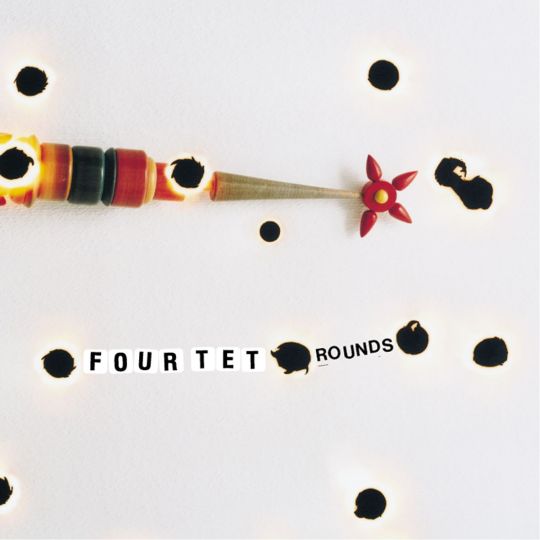
FOUR TET//ROUNDS (2003) Rounds feels like the sophisticated older sibling to one of my favorite albums, Since I Left You by the Avalanches. Built with an Avalanche-ian approach, Rounds is composed entirely of samples, looping endlessly in and out of sync with each other in fascinating and compelling ways. Four Tet’s hip hop worship comes out of the woodwork occasionally in the form of hard-hitting drums, but I think the album is a lot more interesting the more formless it gets. My favorite track, And They Look Broken Hearted, shifts tectonically from sensual vibraphone noodling towards melancholy harp figures and nervous jazz drumming that anxiously builds and fizzles out in this totally random and stuttering way. I’d say the track never once repeats a measure, except part of the fun is that the track is barely made up of measures to begin with. The approach is way more based around loops, starting and ending based more off of emotional cues than accordance towards a rhythmic pattern or grid. It’s endlessly detailed, sexy, funny, and super chill. Great study music, great music period.

SIC ALPS//SIC ALPS (2012) Sic Alps plays like garage rock’s attempt at something like the “Great American Novel,” full of poised sophistication, folksy ramblings, sincere declarations of love and laziness, and a lopsided sort of virtuoso approach that sees the band pulling in string sections and grand pianos as well as playing out their take on sun-bleached folk and, of course, psychedelic riffage. Taken all together, the record seems like an attempt to encompass the entire history of California guitar music at once; I think it’s a blast. Fans of guitar music will be able to find almost anything they care to look for in this thing: when I listen, I hear shades of Neil Young (Lazee Son), Credence (Moviehead), Wilco maybe (God Bless Her, I Miss Her), and even Radiohead on the excellent opener Glyphs and the album’s languid anticlimax, Rock Races. It’s basically a garage record, just with a ton of gravitas, which the record earns, and which is such a welcome change of pace within maybe the only genre that’s still more prolific (mostly to it’s detriment) than hip hop.
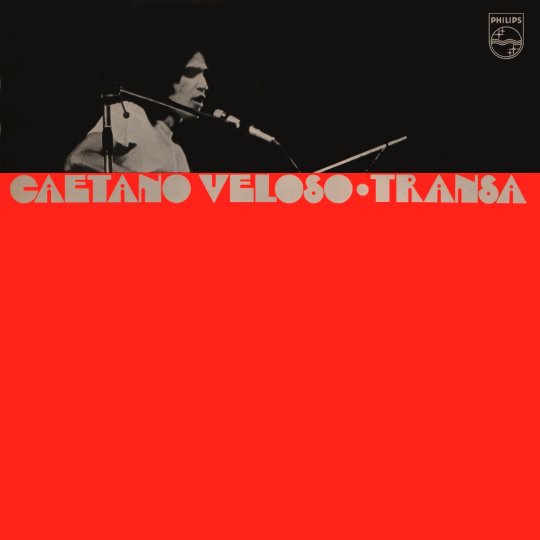
CAETANO VELOSO//TRANSA (1972) Probably one of the best records within that notoriously short-lived world of Tropicalia, an extremely fun but inherently self-destructing kind of protest music in Brazil c. the ’70s that responded to the government’s isolationism with gleeful appropriation of Western music into already awesome Brazilian styles. Transa, however, is anything but gleeful. Written in exile, the album is a dark rumination on loneliness and politics that expertly works in standards like Mora Na Filosofia (a highlight) as well as hyper-Western balladry on tracks like You Don’t Know Me and closer Nostalgia. A snapshot of a fascinating period in history as interpreted by a great mind, Transa can almost establish its significance on context alone; the musicality and crazy cultural diffusion going on all over this record are what elevates it to a classic for me.
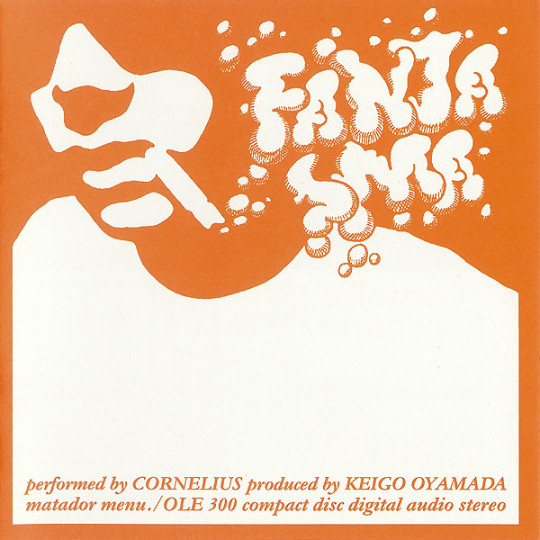
CORNELIUS//FANTASMA (1997) Yet another sort of companion piece to Since I Left You, Fantasma proves that plunderphonics isn’t a dead end by joyously exploring its every nook and cranny and turning out some of the best music that little genre has to offer. Building songs around ideas that are like, Weird Al or They Might Be Giants level oddball, Cornelius makes music out of the sound of his own walking into the studio, text to speech generators, and occasionally out of ideas that date themselves a little (midi renditions of classical music, lol.) All of the comedic fanfare serves to make the moments of true musical beauty hit that much harder, like on early standout New Music Machine or the Apples In Stereo-featuring Chapter 8 - Seashore and Horizon. A highlight of the Japanese micro genre of Shibuya-Kei, Fantasma is an album that holds a remarkable amount of conceptual heft for how light it sounds, and that puts a smile on my face like almost no other record I know of.

DJ KRUSH//MILIGHT (1996) In 2017, hip hop albums that truly feel like they’re even trying to sound definitive are few and far in between. The kids just aren’t interested in that kinda shit, and that attitude seems to be traveling upward as mainstays in rap continue to peddle out middling and unexceptional releases (OK, maybe I’m still salty about DAMN.) I think that’s all part of why I find myself so attracted to a lot of relatively older stuff, where hip hop is concerned. It isn’t so much a sonic preference as a political preference; I guess I’m just more of a fan of albums that seem to be trying to make big, serious statements. A running short list of such records would probably include oh, say, Aquemini, GKMC, Exmilitary, and DEFINITELY Milight. If that sort of definitive intent doesn’t reach you through the featured rap verses, mostly in Japanese, than let it hit you in the form of Krush’s perfectly sculpted instrumentals, which engulf and cradle spoken word messages from each featured rapper about their hopes for the future just as readily as they hold down incredible verses from a veritable who’s who of underground rappers and, curiously, Mos Def. The record is a masterclass in sampling and old school production as well as an incredible atmospheric and moody record that’s basically total ear candy with the perfect amount of substance and depth to keep it truly compelling.

ALVA NOTO + RYUICHI SAKAMOTO/VRIOON (2002) German electronic minimalist Alva Noto and Japanese virtuoso composer Ryuichi Sakamoto have a fascinating chemistry that, perhaps due to its subtlety, flies mostly under the radar; except, when it doesn’t, like when the two get commissioned to score The Revenant off the strength of incredible albums like Vrioon. Vrioon is basically a conceptual exercise, pairing Sakamoto’s piano improvisations with Noto’s infinitesimal manipulations and glitchy not-quite-beats. The two ingredients here compliment each other in unimaginably rewarding ways that continue to reveal themselves upon further listening - the ringing glitches of Uoon I anchor formless piano parts that subtly shift in increasingly disorienting ways, making for a remarkably serene yet engaging listening experience that I just can’t get enough of. Speaking from experience, this is the kind of music that would make any sunrise or sunset magical, and I can’t recommend it enough.
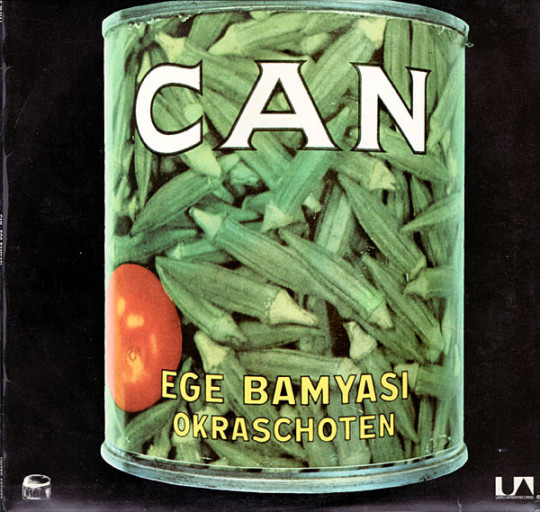
CAN//EGE BAMYASI (1972) I’d listened to Tago Mago once or twice and was generally familiar with Can’s lofty reputation, but it didn’t start making sense to me until I listened to Ege Bamyasi. For all of the praise the band gets for being innovative and experimental, what’s so great about Bamyasi is the clear pop sensibility: most of these songs are short and sweet, and they press forward with a relentless momentum that brings the record a lot of immediacy and energy. Even when the band slows the tempo way down like on Sing Swan Song (which Kanye sampled for Drunk and Hot Girls, btw) or switches up the instrumentation on Spoon, everything sounds pretty unified and tight, and every song is really, really catchy.
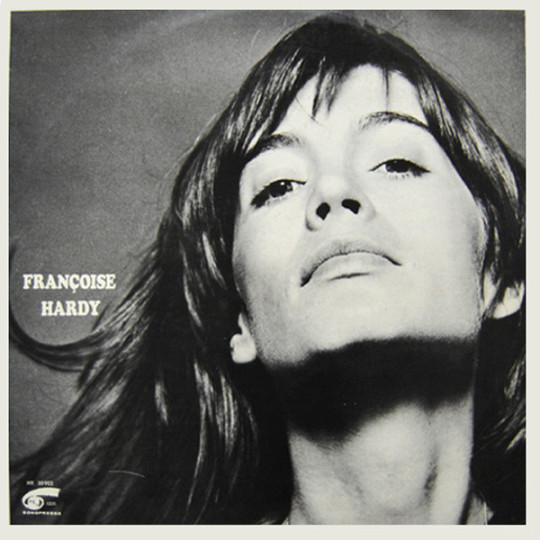
FRANÇOISE HARDY//LA QUESTION (1971)
One woman institution of French pop Françoise Hardy explores the styles of Bossa Nova on her eleventh (!) album, a super low key acoustic affair that rarely has more than a thing or two going on at once. Built around cycling acoustic guitar figures occasionally supplemented by strings and bass, the album gives Hardy a lot of room to establish her vocal presence, which she does super effectively. The minimalism of the record makes it sound timeless, and the arrangements are cinematic and lush and sexy but also super intimate and tiny, all at once. Needless to say, La Question a pretty striking record.
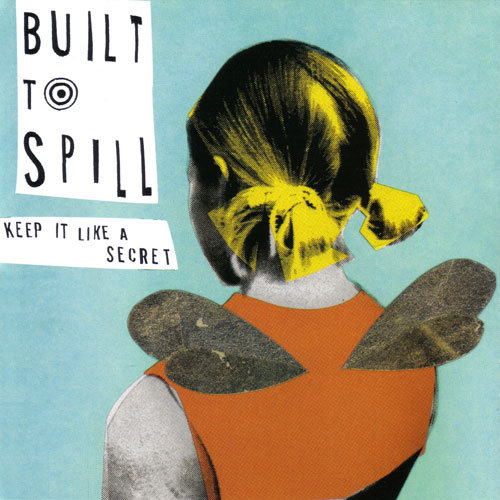
BUILT TO SPILL//KEEP IT LIKE A SECRET (1999) I’m not gonna be the guy that tries to figure out what it means, but no one can deny that “indie” doesn’t mean the same thing now as it did in ’99 when Keep It Like A Secret dropped. In 2017, it’s acceptable to put the modifier R&B after indie, artists like Father John Misty are making plays for the sex symbol status held in years past by mainstays of white-bread rock and roll, and most indie fans are as readily courted by hip hop or electronic music as they are “indie” (I stress, none of this is a bad thing.) Indie in ’99 was a way more bookish, cloistered, specific sort of scene, and Keep It Like A Secret really exemplifies that vibe to me. A basically pretty sexless record built around hyper-literate lyrics about the meaning of life and personal shortcomings, Keep It is so endearingly low-key that falling for the record mostly just feels like making a friend with whom you can speak in an intimate and esoteric way. The guitars are angular and math-y in some places, and awesome and anthemic in others, like on ripping opener The Plan and personal favorite Temporarily Blind. Among other things, Keep It Like A Secret sounds like the perfect soundtrack to the charming and twee indie (ha) movie most people see their life as nowadays; well, I don’t know, maybe that’s just me.

YO LA TENGO//I CAN HEAR THE HEART BEATING AS ONE (1997) Keep It Like A Secret came out two years after this behemoth of a record - and yet somehow, I still feel like I Can Feel The Heart Beating As One as maybe the first major stepping stone between the indie of the ‘90s and the indie of today. The major innovation? This is lover’s music, played by actual married couple Georgia Hubley and Ira Kaplan. Whether they’re summarizing the entire history of shoegaze into a single song or covering the Beach Boys, Yo La Tengo always keep the vibe sleepy, chilled out, and super seductive, and god damn, it just works. Those who know me might find this hard to believe, I always find that I have the least to say about the things I love the most. I Can Feel The Heart Beating As One is one of those things. So much of what makes this album special is how intimate and warm it feels, qualities I could never communicate as well as the music itself does. Please, listen to it. ASAP.
1 note
·
View note
Text
[Translation] Wink Up June 2017 - やまけとの歩み
Wink Up June 2017: やまけとの歩み Never knew that it will be this long! I take a longer time because of my hectic work. I think I used up all my brain cells to finish this. Anyway I’m trying my best to translate. In case you did found any mistake please tell me so that i can improve my translation. Thank you!
*********
No records on year 2006-2007
Year 2008: Be in the same group and become best friends.
Keito’s goal is “To be able to dance as cool as Yamada” Okamoto : I received a big mirror as Christmas present. I want to dance as cool as Yamada so I’m going to use this mirror a lot during practice. (March 2008 issue)
Among JUMP member, which one is the father and the mother? Yamada: The father would be Keito! He is the most calm among the member. Isn’t weird for a junior high school student would be this calm? Everyone are making lots of noise, but he will be quietly reading his English novel alone. This is no other like a father isn’t? But sometimes, there are times where this thing is broken. That time I realised that “Keito is actually a junior high school student” (laugh) (April 2008 issue)
Year 2009: Just notice our same age on 2nd year of group formation.
More stories about Yamada revealed during MC Nakajima: Because of the tense, there will be separate MC and it’s getting difficult isn’t. In this MC will Keito working hard? Yamada: But he’ll just talk about useless thing. Nakajima: So Keito has lots of stories about Yamada. Based on how he looks at Yamada, he is showing the look like “I’m going to tell something about him”. That’s looks interesting (laugh). Okamoto: “Yamada put his finger in the electric fan” are one of my first stories. Yamada: Wait, why would you say that here? (Laugh). The fans would be worried. I didn’t injured myself so everyone please do not worry. Everyone please don’t try this at home. Okamoto: And Yamachan, recently he’s frequently punching me.. Yamada: Keito, he’s recently getting used with my punch so it’s getting boring. So I’ll tell you, I only let out 50% of my energy. And looks like Keito’s level are getting up, so from now I’ll increasing my energy to 60..70% (October 2009 issue)
******
Yamada: By the way Keito, you are in wich grade now? Okamoto: High 2 Yamada: Eh, that’s the same as me?! I thought you are one year higher. Are you kidding me~~~ Everyone: Eh, after such long time (laugh)? Yamada: I thought Keito is the same age as me! Arioka: Isn’t good? Your knowledge has increased! Yamada: So it’s ok for me to start judging him? Our age gap is near! And he always touching his arm, summer’s weather must be humid for him (laugh)! Nakajima: I get it! Keito even with anyone the distance between them are so near! When the staff talk to him, they need to step back behind a bit. Okamoto: I have low voice , so everytime when I talk to other people, they will say “eh?”, so I thought it would be better if I talk to them more closely… (November 2009 issue)
Year 2010: Begin to spend lots of time together even in private.
Keito crying when he can’t reach the meeting place
From Keito’s no 1 subject…. Yamada: He’s no 1 cry baby. Okamoto: I’m not! Yamada: You cried the other day! Me, Daichan, Chinen and Keito had a meeting the other day, but he’s getting lost and he cried. Okamoto: it’s not like that! If you’re not describing the location to me properly, I will getting lost like a kindergarten child (laugh). I couldn’t find the location you described to me and wondered around in hurry. I have made everyone waiting for me. And i thought that i have trouble everyone. Nakajima: Keito is surprisingly nice. Look! You can cry now. It’s ok now! So start crying! Okamoto: I don’t feel like crying. But those kind words you told me, you will make me crying like an elementary school kid so stop it. Nakajima: AHAHAHA! Is it not good? (Laugh) Yamada: We are surprised too, so we asked him “why are you crying?”
Year 2011: Surprised at Keito’s new side
Jealousy towards gentleman’s side of Keito?!
Chinen: If everyone had a girlfriend, how would you show your feelings in front of her? Nakajima: Keito is a gentleman so he seems like will be nice to all the girls (laugh). Chinen: I get it, he looks like will listen to anything his girlfriend say. Like a butler? Keito: What did you say a butler (laugh)! It’s like devoted type, this is a better way to say it! Chinen: And then he will go “I’ll do anything for you, you should do the same thing to me too” and then that relationship happens. Okamoto: Isn’t such thing is expected at the end? Yamada: Keito, I will not forgive you if you’re meddling with my girlfriend! Even if you’re just being usually kind, i will not forgive you! Nakajima: Me too! I will beat you with my drum sticks! (laugh) Okamoto: Since all of us doesn’t have girlfriend, so that’s not threatening me (laugh). And Yuto, now you are holding your drum sticks for real (laugh). But let me say it, in my eyes, I only see the girl that I like so such things you say wouldn’t happen (March 2011).
Q. In Junior days, being as back dancers in which concerts that was fun? Chinen: About this, Keito doesn’t have any experience as back dancers. Yamada: Seriously?! Okamoto: ah that’s right~ As for me, the very first choreographer I remembered was (Hey! Say!) Yamada: isn’t rather recent? (Laugh). Being as the Senior’s back dancer, we can take part in the tour and it was fun. Chinen: Right! It’s a little bit pity if you are not be able to experience that. To be honest I only experienced it once. Yamada: Eh really?! Chinen: Yeah, I’m only being as the back dancers for NEWS but for tour only for KAT-TUN Nakajima: Me and Yamachan have pretty much experience. Yamada: Yosh Keito! Even now it’s still not too late. You can go being a back dancer! Okamoto: Eh, for Sexy Zone? (Laugh). Yamada: AHAHAHA! That’s good! Senpai as Kouhai back dancer! (Laugh). I’m going to watch it Okamoto: If you say that it would be good there then I would be glad to do it (December 2011 issue)
Year 2012: Keito begin to be in love with Yamada
Yamada showing his tsundere side
Yabu: On『JUMP’s recently』talk’s theme, according to the staff’s information, Inoochan’s team talks about “Recently, Keito is madly in love with Yamada” and the evidence seems increased. Okamoto: Wait, what’s with that? (Laugh) Yabu: When Keito talks with Yamada, no matter who calls your name, you won’t hear it… Yamada & Okamoto: AHAHAHAHA! Yamada: I’m also aware of that a little. This current Keito, his approach become more great. Yabu: Even in the other day magazine interview, “Who become more mature? it’s Yamada” he talk about it enthusiastically (laugh). Both of you are really getting along very well Yamada: That’s right. We hangout quite often. Okamoto: Also, occasionally we will wear similar clothes. Because we have similar preference in clothes, we tend to buy similar kinds of clothing (June 2012 issue)
Yamada: When we went to watch (PLAYZONE) together, Keito’s tension is too high. He’s become troublesome mode’s person. Okamoto: It was a continuous holiday, when I know i can meet the members after so long I become too happy. Nakajima: Ah~ because you love Yamachan right (laugh). Okamoto: But he’s ignoring me. “Oo Yamachan, it’s been a while” when I said it with the such maximum tension, I’m showing troublesome like face. I’m shock. Yamada: If it’s for one time I would be happy. But it has been many times over and over again. Normally I won’t say that it’s annoying. I didn’t mean to follow but Keito at the hotel area or in the same room as me, he is actually an easy going person Okamoto: seriously?! Yess! (October 2012 issue)
Year 2013: Yamada usual strictness towards Keito (laugh)
Keito is chosen as his member’s mutual affection. Yamada: I told you before this talk begins. Keito! I’m going to buy that yellow sweater you are wearing for our costume today, so you don’t make it dirty! Even one drop of sweat I won’t forgive you! Okamoto : Ok.. but with that so much pressure it will cause me to sweat a lot (laugh). Nakajima: Which part of the sweater is your favourite point? Yamada: The colour and the texture? Roughly because I feel that I like it. Okamoto : And the most important reason more than anything else is “because I wear it”. Yamada: Shut up! I’m going to wash it immediately as soon as I get back home! (laugh) Everyone, did you buy the clothes that you like? Are you are the type who goes shopping and buy it? (June 2013 issue)
Q: Stunned! an episode of mutual affection with members. Yamada: The other day after we appear in a music program, one of the co-star song keep lingering in my head. I’m humming the song in my head but at the moment we get off from our transport, suddenly I sing that one phrase out loud. And then exactly at the same time Keito also sing that phrase too! That coincidence isn’t amazing? Like we only listen to that song once but it keeps lingering in our head for all day long. As for myself it’s like JUMP’s song BOUNCE. And the part “Everybody、JUMP” is the only part that keep playing over and over again (laugh) (September 2013 issue)
Year 2014: Talking about loving each other on 7’s meeting
Yamada at private revealed!
Okamoto: I usually hangout with Yamachan. The Yamachan I met in private, his character is different from the Yamachan I met in JUMP. With JUMP, as usual everyone will tease me. But in private he didn’t do such things, he’s completely a normal person. He’s not that straight and he will listen to all my stories. He’s totally have different look (laugh) (February 2014 issue)
LOVE message to lovable Okamoto Keito! Yamada: At 7’s meeting, Keito suddenly said to me [You know, I like Yamachan a lot! At the concert I’m always thinking “Sometimes I want to become aa” while watching you]. I’m almost about to cry (laugh). He is totally honest as he can say such thing straightforwardly. I like that side of Keito! (March 2014 issue)
Year 2015: Yamachine affirmed that Keito always being clumsy
Unintentionally teasing him
If Yamada would spoiled you immediately what you want him to do? Keito: I would like to change our role for 1 day. Today too, as soon as I enter my workplace he asked , “Did you bring Weekly Shonen Jump today?” and when I told him “I didn’t buy it” he said “Go buy it!”. And then, the manager bought it for me and when I thought i’m going to read it, he said “stop it that’s mine”. I also like to do that but if a person who doesn’t know anything saw this, I’m completely running errand for him. That’s why I want to change our role for only 1 day so that I can try to say “Go buy JUMP” or “taste this thing” (laugh) (June 2015 issue)
Yamada: Keito is basically clueless. (Chinen who is nearby also agreed “He is getting clueless, he looks like he’s off guard). He is easily get punched, kicked or attacked by me (laugh). And his reaction when I hit him was “it hurts~” but he said it with a calm tone. Then I will said “It’s hurt isn’t? Let me make it more hurt” (laugh). The way he did that makes me feel to tease him. He is cute isn’t? Because he’s just cute, I’ll unintentionally teasing him. I had never received any payback from Keito. So if he’s going to do that to me, I’ll pay him back double (laugh) (December 2015 issue)
Year 2016: Good friends story talking about same episodes
Discover Keito through the GPS and play darts at Yamada’s house.
An episode where you realised all over again of the importance of member’s love. Yamada: on the day I finished filming drama early, there’s something I wanted to do with Keito. So when I look at my GPS, I saw him nearby my house. I thought “This is the chance!”. I told him “Sorry, there is something I want you to do, come over for a moment!”. We sit at the veranda there and had a cup of tea. Then I let him go home (laugh). We played darts at my house, talk about the darts. He’s not choosy about the tea so I bring out cold oolong tea (laugh).
Keito: About 3 days ago, I went to Yamachan house for a while. I happened to be near his house when he suddenly called and ask to have a tea with him. He really served the tea and since he has dart board we played for about 15 minutes and then I went home (laugh). Recently I had not seen him in private so I haven’t go to his house for quite sometime.
P/s: i will re-edit again. I leave this here for a while
67 notes
·
View notes
Text
An interview with Kenya's Muthoni Drummer Queen
Muthoni Ndonga is a giant of the Kenyan music scene. Whether delivering an unbeatable flow as Muthoni Drummer Queen or in her role as founder and CEO of one of East Africa’s finest music events, Blankets & Wine, Ndonga has clearly earned her titular crown. Her artistic and entrepreneurial supremacy is such that it’s no surprise to learn she’s also known as ‘the boss lady’.
youtube
Or perhaps that should that be boss ladies? For on the forthcoming concept album SHE, Ndonga channels the experiences of eleven different women across eleven different tracks, telling their stories across sleek, powerful beats provided by Swiss production duo GR & HOOK!. “These women are mainly urban dwellers”, Ndonga explains, “and all of them are layered, complex individuals. The topics I chose to cover include love, failing marriage, difficult relationships with mothers, entrepreneurship, betrayal, among others. Expect a roller coaster of emotions delivered on some amazing instrumentals.”
The singles released so far suggest SHE is going to be Muthoni Drummer Queen’s strongest work to date, from the anthemic, reggae-tinged ‘Million Voice’ (which we premiered last month) to the incendiary ‘Kenyan Message’, a strident Swahili tribute to Grandmaster Flash that shames everyone from the country’s politicians to disgraced former FIFA president/crook Sepp Blatter.
We recently sent Muthoni Drummer Queen some questions on music, politics and past lives; read on to find out her early music loves, her hopes for the rescheduled Kenyan election, and how she overcame family pressure in order to break into music…
youtube
Hi Muthoni. We love the way ‘Million Voice’ encourages strength through collective solidarity. Have you always had a powerful voice and ability to speak up for people, or is it something that has developed over time?
Muthoni Drummer Queen: That’s a great question. I never really thought of myself as a voice for the people, more like a voice with the people. From my first single ‘Cool Waters’ I have always presented my thoughts on what is happening in the Kenyan society and I suppose over time I have become more comfortable in that role. I do shudder at the use of the word “activist”, I think we are all powerful, that’s what governments/politicians all over the world know, that people are literally the power, and that’s what they hope we never learn.
Your flow on the track reminded us a bit of M.I.A., is she an influence on your music? What other artists past or present do you find inspirational?
Why thank you. I love M.I.A. though I didn’t have her in active consciousness while writing/recording ‘Million Voice’. Lauryn Hill, Anderson Paak, Bryson Tiller and Missy Elliot are my present and previous yet still current loves.
Your previous single ‘Kenyan Message’ addressed some of the failings of the Kenyan government. It seems things have grown more chaotic even since then. What are your hopes for the re-run of the election?
That the election is credibly run, that the electorate aren’t too apathetic to the cause and turn out to vote and that we find a new normal that is less maddening than where we are now. One can hope.
Fingers crossed. Tell us what sort of music you listened to when you were growing up?
I listened to a whole lot of rhumba from Congo, some pop music from South Africa and pop-house music from the States.
youtube
When did you start making your own music and what was it like?
I think I wrote my first song when I was 11, I think it was even pretty cool, but it was not till 2004 that I decided to be a musician, write music and put on performances. On one hand it was super exciting in that I was coming into a dream I had always wanted to pursue but didn’t think I could (parental/societal pressure). On the other hand it was the hardest/most challenging thing. My mum was completely against it so I had no real family support and no resources so everything was good will + beg/borrow/steal. It was super tough.
When did you adopt the title Muthoni Drummer Queen and where did the name come from?
I played a show in 2008 and the picture I found was of me playing the drums, so I captioned it “Drummer Queen” and my fiends thought it was cool so I adopted the moniker in 2009. Ive been playing traditional percussions since I was 14 years old so I guess it had to evolve into something 🙂
Your forthcoming album sees you adopting the characters of eleven different women. Which woman’s story did you particularly enjoy telling, and which was the most challenging?
That’s interesting – I have no favorite as yet. Each song is so dear to me and so complete in its intention, I am struggling to see how I could possibly make any my fave. ‘Caged Bird’ was probably the hardest because it felt too close to home. That and the 2nd Verse of ‘Criminal’…
Speaking of multiple characters, your press release talks about past life experiences – which one stands out as the most unusual, and why?
Shaka Zulu’s harem. Nothing can explain that lifetime. The things experienced…
GR & HOOK! produced the album – how would you describe your music-making process with them?
This is the third studio album for me, and the second one with Hook & GR! It’s clear that each time is different. The first album The Human Condition is quite like SHE in the sense that they are both concept albums, but SHE has come out of a three year relationship making music, playing gigs and growing a friendship with GROOK! This time we really did make things together from scratch and we were able to bounce off each other’s energy more naturally.
Can you send us a photo of the view from your window?
How would you describe Nairobi’s music scene right now. Any artists we should be checking out?
Blossoming! Finally! So excited that we’re done trying to chase the “sound like Nigerian pop” dream and more space is emerging for a spectrum of sounds. Best part is that the audience is demanding for more and rewarding the growth with streams on spaces like SoundCloud, attendance at events and sharing the music with new/potential fans. Artists across multiple genres are collaborating with one another and it’s really an exciting movement.
What are the top things you’d suggest visitors to Nairobi should go and see/do?
Must do: Drive out to Olepolos and have an awesome day eating roast meat in an unmatched scenery, do the morning game drive at the Nairobi national park, attend Blankets & Wine music festival (quarterly day into early evening live music party).
What’s the biggest challenge facing musicians in Kenya at the moment?
Monetization of influence.
Finally, where in the world would you most like to perform?
Tokyo, Japan at a massive festival. I think we would kill it!
No doubt. Muthoni Drummer Queen, thank you!
youtube
#african rap#anderson paak#blankets & wine#Bryson Tiller#global rap#GR & HOOK#hip-hop#kenya#Lauryn Hill#m.i.a.#mdq#Missy Elliot#Muthoni Drummer Queen#nairobi
0 notes
Text
Keep Me Where The Light Is.
I’m not going to lie. I’ve been having a little bit of a hard time over the past few months. Usually I turn to music during times like these. However, I haven’t had too many shows on the books over the past couple of months, which has been good because I don’t think I would have been able to handle the other things that have been going on for me. But not having lots of shows is also a bad thing, because I depend on shows to help me out. And if I can’t get to a show, then I at least want to be home listening to plenty of records. And I haven’t even been able to do that much lately. Oh the humanity!
Towards the end of this week, while I was driving and listening to John Moreland’s fantastic album High On Tulsa Heat, I realized that my year is over half finished. And I also realized that, for most of this year, I haven’t been in the frame of mind that I would like to be. As the album ended, I told myself that I would reset my view on the year, starting at that moment. We’ll see how that goes, because it’s not going to be the easiest thing to do. I’m on the right track, though. And I think music played a key role in that! This was the first weekend since mid-June where I had shows lined up on BOTH days. I can’t believe it’s been over two months since I’ve had that. And even during those two months, I haven’t had many shows at all. As I said, this hasn’t been a typical summer for me.
Luckily, it looks like music might have helped steer the ship for the end of the summer. On Friday I got to see one of my favorite summer bands, Goo Goo Dolls. I saw them last year for the first time, it was at the same venue as this year. It’s a sign of a great show when you get asked to come back for a second year. I loved last years’ show, and I loved this year’s show too. I’ve always been a big fan of their hits (and they have A LOT of hits), but before last summer I wasn’t very familiar with their albums. I’ve spent some time listening to a few of them, and I love them. Their most recent album, Boxes, is really great, and you should definitely check it out.
This year’s show was so much fun, and the venue was packed. I don’t think it was a sell-out, but it was close. The crowd brought the energy, and so did the band. Of course they played a lot of their hits – but what’s wrong with that? Their hits are so good. There aren’t many bands that started in the past 30 years that have more hits than the Goo Goo Dolls. And they played plenty of non-hits as well. I feel like I’m MORE familiar with their music this year, but probably knew LESS of the songs than last year’s show. That’s not a bad thing. It only means I need to spend more time with their music so I’m ready for their next summer show, which I hope will be next year. Either way, I’ll definitely be there!
The next night, I went back to the same venue, this time to see John Mayer. I’ve seen him once before at the venue, back in 2010. That show was a big disappointment. He didn’t put on a bad performance per se, but he wasn’t really into it and it looked like he was ready to end the tour and go into hiding. If you’re familiar with what was going on in John Mayer’s life in 2010, then you’ll know why.
After that show, I took a break from John Mayer’s music for nearly two years, until he released his great album Born & Raised. I was REALLY into his music from 2006 thru 2010, and everything before 2010 was top-notch. The shows were great, which shouldn’t be a surprise because he was touring in support of the Continuum album. The shows I saw in 2007 and 2008 helped me get through some seriously tough times, and I’ll never forget how emotional those shows made me, and how connected I felt to the music.
That all changed in 2009. I personally was riding pretty high. I was going to a ton of shows, and was connecting to a lot of music. Any time a favorite musician/band announced a new album or tour, of course I was going to be in. And I expected to feel connected. But I didn’t feel that with John Mayer’s music in 2009-2010. Like I said, the shows weren’t bad, but they seemed uninspired. And they were definitely a shell of the shows I saw in 2007 and 2008. I was ready for a break from John Mayer’s music, and although I listened to his next two albums, I missed the shows due to prior commitments. So when he announced a tour for this year, I was excited to start back up with his shows.
The show I saw in April was really great. It made me realize how much I love his music. It reminded me of what a truly talented musician he is. Yes, he’s great at guitar. But that talent gets so much attention that I feel like it overlooks how great of a songwriter he is. Talk about a hit-maker! Wow!
I think I had even more fun at Saturday’s show than I did in April. It actually felt like a totally different shows. I think there’s just something about a summer show that makes the truly great musicians step it up a notch and make the shows more special. This show felt looser. It felt like he was just PLAYING the music. April’s show, while no doubt incredible, felt more like a PERFORMANCE. That’s not a criticism, but just an observation.
There were so many highlights from Saturday’s show that I don’t think I can capture all of them. Like the show in April, he played three different formats: full-band, solo acoustic, and John Mayer Trio (!!!). He started with the full-band set, playing five songs, ending with a mind-blowing segue of “Why Georgia” -> “No Such Thing” -> “Why Georgia”. This was even more incredible than it looks on paper, and worth the price of admission alone (and for non-setlist watchers, a “->” indicates a direct segue into another song).
The acoustic set of course was great. It started with “I’m On Fire”. If you think I didn’t go nuts hearing John Mayer cover Bruce , IN NEW JERSEY, then you are definitely wrong. And like a good, knowledgeable musician, he knew that the crowd wasn’t boo-ing him at the end of the song. He also played “Your Body Is A Wonderland” during the acoustic set. Talk about a great song. Wow. I have no problem with a pop song, especially when it’s great. I don’t know how someone could say that “Your Body Is A Wonderland” is not a great pop song.
One of the obvious highlights of seeing John Mayer in 2017 is being able to see John Mayer Trio. This is a band that, before this year, I never thought I would ever see. Their set on Saturday was RIDICULOUS: “Good Love Is On The Way” (one of my favorite John Mayer songs), “Vultures”, and “Wait Until Tomorrow”. At the end of that run, the sold-out crowd was justifiably in need of a little breather. The last nine songs were all great, and throughout the night, John Mayer was in a great mood and very gracious with the crowd. This seemed like a totally different guy than the one I saw in the same venue seven years ago. And I felt it too. I felt that connection that I didn’t feel seven years ago.
Opening the John Mayer show was Dawes, another one of my favorite bands, especially in the summer. I’ll never forget how I used to hate them without never knowing their music. My local radio station, WXPN, hypes the band so much (with hindsight, I realize that’s completely justifiable). For years I heard about how great Dawes was. It turned me off. Then one summer day in August 2015, I was driving and listening to WXPN on the radio. This song called “All Your Favorite Bands” came on. I pulled the car over and cried like a baby. It was one of the most beautiful and emotional songs I had ever heard. After I composed myself, I pulled out my phone and looked up who sang the song. It was Dawes! Of course! I vowed right then and there to never again judge music before actually listening to it. I can’t imagine having never heard a song as beautiful as “All Your Favorite Bands”. If I had known it was Dawes when the song first came on, I might have changed the radio station. That would have been an awful decision. I’m glad I no longer do that. And I’m glad I have music and friends to keep me going. This weekend was evidence of that, and it was sorely needed. Just keep me where the light is.
#goo goo dolls#john mayer#dawes#music#bruce#springsteen#new jersey#live music#summer#concert#beach#philly#wxpn#xpn
0 notes
Text
Blood of a Poet
Through fleeting glimpses and a studio visit, a portrait of a singular songwriter and musician emerges.
On the song "Supreme Being," Will Roan, singer and keyboardist of the Brooklyn band Amazing Baby, experiences a transcendental moment. It's an everything's-okay, no-one-ever-really-dies moment, in which everyone and everything in creation is revealed as mysteriously connected. Steeped in mysticism, tracks like "Supreme Being" (a trance song composed on the xylophone and a highlight of the group's self-released 2008 EP, Infinite Fucking Cross) convey a sense of wonder and a longing to return to paradise. Lyrics about "digging up the pearls from years gone by," returning to "salt of the earth," and a "big, black phantom love [that] floats over it all" contribute to the impression of a universe governed by some kind of cyclical, eternal return.
The group’s first tracks sound as joyful and cohesive as Led Zeppelin songs, only half the length, and recent songs are awash in a sweeping but pleasingly off-kilter grandeur. Their potency boils down to an inspired pairing of Roan, a literate preacher’s son, and Simon O'Connor, a virtuoso hard rock guitarist. The bands they had been in before Amazing Baby were good, but very true to a genre. But the project the pair formed together was a hybrid of influences (mutual favorites that included T. Rex and Queen), resulting in soaring melodies and full-bodied, boundary-pushing art-rock. In August 2008, a writer for the popular British music magazine NME raved about their first batch of songs, “Truly great rock bands don’t usually just fall out of the sky — they evolve slowly, meticulously and sometimes downright painfully over time. But don’t expect Amazing Baby to be paying any such dues... These Brookynites have been together since Christmas..., but somehow, they already sound like they could take on the world.” With the release of their first album Rewild due in the first half of 2009, Amazing Baby seemed on the precipice of a breakthrough after a near overnight success story.
When I arrive at Electric Lady studios at 4pm on the first Sunday last February, the band is putting the finishing touches on their debut album. It's the second-to-last day of recording and a 15-piece orchestra is coming in today to record their parts individually. Bassist Don De Vore—pale blond, handsome, silent—sits in the recording booth nearly the whole afternoon, overseeing the recording of the string and brass parts. Matt Abeysekera, the drummer, pops into the booth and excitedly chats about the soundtrack to Polanski's horror movie The Fearless Vampire Killers. Shy, stringy-haired rhythm guitarist Rob Laasko hangs in the green room for a while, in between long spells in the recording booth. He seems like the mellowest member, but like De Vore, he has the air of a longtime studio musician, who is used to being ignored. Roan and his girlfriend arrive last, after a late night of DJing at a Greenpoint warehouse.
Confused, insulted, and dazzled by Will
With his self-assured manner and clean-cut features, Roan could easily pass for a cultured character in a Wes Anderson movie. Today, after weeks of nonstop recording for the band's debut album, the idiosyncratic singer-keyboardist seems to be running off of a streak of final-stretch adrenaline. In the green room, he drinks Sparks, a caffeinated alcoholic beverage, which keeps him on an even keel between seeming wiped out and alert, relaxed and lucid. He possesses a precise eye. During our interview, he’s polite but brisk, not finicky but quick to correct me when I’m wrong. When I ask him what the song "Headdress" is about, he tells me it’s about "holding onto somebody really tightly" and then tries to explain the title in visual terms. "It's supposed to evoke—I wish I could illustrate this better in words—a distraction, a trick of the eye, a false part of your body. A decoration."
While the teenage O’Connor was into hip-hop, graffiti, and punk music as a teenager, Roan immersed himself in art rock like David Bowie, John Cale, and T. Rex. He was born in Waterbury, Connecticut and his family moved four times before settling in Martha's Vineyard. Roan, who is also interested in design and visual art (he co-designed Rewild's cover art with a friend), majored in creative writing at Bard. After graduation, he moved to Brookyn, where he formed Lions & Tigers, a glam-rock/post-punk outfit that recorded arty, avant-garde songs, filled with images of oceans, fire, and blood. On the tracks, his characters are alienated and often remorseless, dwarfed by a surreal and desolate New York City. They're in precarious and desperate situations. But the songs have the surreal enchantment of a Cocteau movie. Singing about watching the green light die, his girl’s grey eyes, and how she’s “never gonna wake up,” Roan evokes an arresting vision of youth in limbo and casual peril.
He's a gracious host, happy to show me around, introduce me to his friends, and to answer questions. But as polite and friendly as he is, Roan remains inaccessible, even mysterious. Alone, he answers every question I ask. But if other bandmates are around, he lets them handle questions. He seems relieved when he’s surrounded by his friends, as if it’s only when he’s in their company that he can really be himself.
Most people can't be creative on command, but so far that hasn't been a problem for the scattershot singer or his songwriting partner. One reason the band has been so prolific is that they can be productive, and even thrive, in the midst of chaos. (One episode of the Village Voice’s Indie Cribz features a neatly dressed Roan giving viewers a tour of his horrifyingly messy apartment. In the video, he glances around his forsaken-looking bedroom. “I don’t spend a lot of time here,” he says mildly. “This is more like a storage space.”) If anything, he seems more comfortable in a hectic environment. As I interview Roan at Electric Lady studios, string players practice warm-up scales in the room next door. It nearly drives me out of my mind, but it doesn’t seem to distract Roan at all.
While O'Connor rallies me with his raucous energy, Roan is matter-of-fact, precise, guarded. He doesn't like to talk about his band, but he calls MGMT drummer Will Berman who helped write and produce Amazing Baby's first songs "one of the most talented people I've ever met" and predicts he'll put out "a brilliant solo album one day." He encourages me to check out his girlfriend's band (the spooky, shambolic Golden Triangle). And his face lights up with a quirky, genuine smile when he tells me that bassist Don De Vore was in Ink & Dagger "a really incredible, influential vampire-themed band from Philadelphia in the ‘90s." ("Don could do so much better," one diehard Ink & Dagger fan complained on Amazing Baby's Last.fm page.) I learn more about Roan when I'm not asking questions.
For one thing, he’s a good friend. A month earlier, when I run into him at Glasslands, a Brooklyn bar and performance space, I mention that I was surprised by the dizzying heights that MGMT-mania had reached. “Good for them, though,” Roan says pointedly. “Great for them,” I answer. Once he sees that I genuinely mean it, he lets down his guard. I’d seen Amazing Baby at the Mercury Lounge in November 2008 and had asked Roan if he could make me a CD of Lions & Tigers tracks, but he hadn’t had his phone on him. “I wanted to make you a CD, but I didn’t have your phone number,” he explains. He tells me Amazing Baby is recording the next week and that his old band, Lions & Tigers, is mixing an album. “Can I invite you to the studio? Can I invite you to a mixing session? How about if I e-mail you tomorrow?” he says, as he punches my contact info into his iPhone. I tell him that I thought the Lions & Tigers songs I'd heard were great. I love the post-punk sound, I say, and I love post-punk in general; Wire is my favorite band. He brightens. “I love Wire!" And then, in regard to Lions & Tigers, he laughs. "I thought we were good, but no one liked us!” he says.
The first time I saw Roan, he was wearing a shirt that declared “THIS SHIRT SAVES LIVES.” It was November 2008 and I was at the Mercury Lounge for my first Amazing Baby show. Onstage, an impish Roan pranced around the stage with the pomp and exuberance of Jarvis Cocker. After the show, I introduced myself and asked if he could make me a CD of his former band, Lions & Tigers. He cycled rapidly through an array of thoughts like only an overeducated man can. "Sure, I'd be happy to," he answered with a typically cheerful smile, but then he grilled me: “What do you want it for? You just want it? What’s the angle?” He asked me what I thought of the show, knowing it was imperfect. And before I left, he inquired whether this was my first time seeing Amazing Baby live. I told him it was. “You should have come last night!” he admonished me.
Needless to say, I left confused. I was taken aback, even offended, that he was dismissive of his older songs, which I adored. At the same time, I realized that if he didn’t want me to hear his old tracks, then that must mean his new songs sounded a lot different than Lions & Tigers—and that he thought they were really good. Later I realized that he wasn’t being combative because he was a control freak. He simply didn’t want Amazing Baby to be judged by his old band’s tracks. "That was more like a project than a band," he told me, gesticulating. "I was proud of it at the time, but I don't want that to represent me. I don’t want to make that kind of music anymore. That’s why—“ he smiled—“I’m not making it."
His fear of pretension, stutter, and religious connection
Roan cuts an imposing figure. I think twice before crossing a crowded room to talk to the singer—and even after being acquainted with him for months, I find it hard to know how to interpret his sunny, aristocratic charm. It's disconcerting to try to reconcile Roan's bold aura with what he actually says. He is rigorously style-oriented with keen, intelligent eyes that appraise everything. He cannot help but move with a flourish. But in conversation he never says anything remotely audacious or flamboyant. His speech is peppered with prefixes (They're "mega busy," Electric Lady is "super cool") and friendly surfer-stoner affirmations ("totally," "definitely," "rad").
But despite the swashbuckling aura, Roan also has a vulnerable quality. For one thing, his expressive face broadcasts his emotions. And for another thing, he stutters. Though his stutter seems mild (it doesn't surface til the third time I talk to him), one can imagine it’s a source of anxiety for the frontman, especially when he's expected to participate in video and radio interviews, which may catch him when he's tired or ill at ease. (Both states seem to exacerbate the speech disorder.) In one video interview, there's a moment when Roan realizes he's not going be able to get through his sentence without stuttering unless he skips some prepositions, so he starts stringing key words together. It's a heart-rending moment. His bandmates are silent, but it's clear they're in solidarity with the singer.
I would normally think it inappropriate or even disgraceful to ask a stranger personal questions, but Roan is so restrained that I am even less inclined to pry. When I mention that I've noticed a lot of images of eternity in his lyrics, the tone of his voice shifts slightly and there's a flicker in his eye like I'm on to something. "Yeah," he agrees. "Or infinity," I venture. "Yeah," he repeats, in the same tone. "There’s a lot of stony-baloney in there, too," he remarks. Then he lowers his voice and adds evenly, "They’re very personal, but they’re not super specific." I wonder if he means he'd rather not get super specific. (I'd speculate that he wrote "Supreme Being" for his first (or true) love—because on that song he sings "I would die for you,” but in other songs, it's "pump your brakes and leave me alone.") When I ask if Berman will be writing songs with Andrew and Ben in MGMT, he politely answers the question. Suddenly he looks weary. He sighs and shakes his head as if to rouse himself out of a daze. “What else is up?" he asks quickly. Then he corrects himself, as if that way of putting it sounded rude. "Anything else I can tell you?”
In conversation, Roan seems so afraid of coming off as pretentious, that, if anything, he overcompensates for his dandyish hauteur. The boldest statement I ever see him make is in a video interview from their tour of Japan, which took place shortly after Rewild’s release. He says he's proud of the album (though he looks disappointed)—it's been a learning experience (he looks very unhappy)—but it's definitely the best thing he's ever been involved in.
(In fact, I think his newer lyrics also reflect this desire not to seem pretentious. Rewild's new songs don't have big words, and in avoiding them, his lyrics turn absurd and playful. Roan's word play comes off like an inside joke with himself. The title of the album, for example, seems to be a composite of a line on "Kankra": "Turn off your mind/Relax a while." (Get it? Re-wild.))
Once you learn that Roan’s father was a preacher, suddenly everything about Amazing Baby makes sense: the singer's giddy stage persona (shades of a raving evangelical preacher), the Garden of Eden allusion, and the infinite cross imagery. But it also lends pathos to his story. Roan told FAQ Magazine that the first time he got high he had an internal dialogue with himself about how there was no going back, adding that he "continually thinks ... about things I told myself I'd never do." The debut album by San Francisco band Girls is touching because of its sincerity; when former Children of God member Christopher Owens sings that he doesn't want to cry for his whole life, it sounds genuine. There's a similar wistfulness about Roan's longing to return to innocence. Roan has characterized himself as "super emotional" and "messed up." But he seems like a conscientious guy who wants to believe in a higher power and tries to be a good person.
That’s the thing: He has a conscience. More than six months after sitting in with them at Electric Lady, I see Roan at a show at Webster Hall (his friend Max McDonald’s band, Psychic, is playing) and I tell him I'm sorry my story hasn't been published; I'm still going to do a story about the band. "It's okay, it's cool," he says, but he's a person who values honor, and as long as you try to do the right thing, he will be as personable as possible. Suddenly, he’s smiling.
—Julia Yepes
editor: Maura Whang
February 21, 2010
0 notes